#i have so many poems to cross-post but this was the most important
Text
May the worst thing that happen be a piece of burnt toast or running a few minutes late or a simple rejection.
May the best thing that happen be smiling without worry and with no fear of what is around the corner.
May the biggest dilemma be what to eat from a fully stocked fridge and overflowing cupboards.
May the easiest choice be saying yes to thing you want no matter how much it scares you.
May the biggest hurt be cured by time or medical care or both.
May the largest win be something that matters to you and only you.
May the start of the week be accompanied by some grumpiness about returning to ordinary life.
May the end of the week be nothing more than a day for the weekly shop and getting things in order.
May the smallest event that happens be waking up in the morning and being happy.
May the biggest occurrence be uneventful.
May we have the privilege to be unremarkable.
new year's resolution: be unremarkable
#sumayyah writes#writing#poetry#poem#i have so many poems to cross-post but this was the most important#because it was the goodbye this year/hello new year poem#yes it's political#there are genocides happening around the world#how could it not be#we are going to hear fireworks whilst they hear bombs
11 notes
·
View notes
Text
anzac day -> lest we forget
I would like you to do me a favor, and try to picture a scene in your head. Attempt to picture a land of mud and heat, blistering your skin as you merely stand. Head to toe in thick uniform, you and your troops stand in preparation for the landing. Imagine the moment you receive the order, sent to run over those muddy hills, bullets flying your way as they seek to kill.
This is what the landing of Gallipoli felt like for the 16,000 ANZACS on the 25th of April, 1915. The conditions of Gallipoli of course grew worse over the time of the campaign, with the heat or cold, disease, unsanitary conditions, terrible food and of course, the daily deaths of fellow soldiers taking its toll.
I figure I ought to explain what ANZAC means before anything else. ANZAC stands for Australian and New Zealand Army Corps, and was the title given to the armed forces who fought in the Gallipoli campaign during World War 1.
ANZAC Day is held on the 25th of April, the same day the ANZACS landed in Gallipoli that fateful morning. 2,000 soldiers were killed or wounded upon the first day, and those who weren’t killed were left weak.
The Gallipoli campaign lasted until the eighth of January, 1916. A total of 8,159 ANZAC troops lost their lives. As sick as it sounds, the death toll isn’t very high. Gallipoli was important for many reasons, including that it was the first major amphibious assault in modern warfare. But it’s also so important because it was seen as a failure, and yet the troops kept going. The soldiers were seen as the bravest of them all.
ANZAC Day is held all over Australia and New Zealand, ceremonies and marching alike to remember the fallen and the serving. We do many things to commemorate the soldiers fallen and alive, some being the Dawn Service and the other numerous marching and ceremonies of course.
Another thing about ANZAC Day are the flowers. Most notable of these are poppies, famous among Australians and New Zealanders for ANZAC Day. Poppies were among the first flowers to grow back on the Gallipoli front, and ever since then they have been a symbol of hope and remembrance for the ANZACs. Another is rosemary, which means fidelity and remembrance. Many people will be wearing poppies and rosemary on ANZAC Day, a sign of their remembrance to the fallen and those who served.
This is a poem by John McCrae called 'In Flanders Fields'.
In Flanders fields the poppies blow
Between the crosses, row on row,
That mark our place; and in the sky
The larks, still bravely singing, fly
Scarce heard amid the guns below.
We are the Dead. Short days ago
We lived, felt dawn, saw sunset glow,
Loved and were loved, and now we lie,
In Flanders fields.
Take up our quarrel with the foe:
To you from failing hands we throw
The torch; be yours to hold it high.
If ye break faith with us who die
We shall not sleep, though poppies grow
In Flanders fields.
Something that happens here is we play a song called ‘The Last Post’, which is then followed by a minute of silence. During this minute of silence, we remember the fallen, dead, wounded and survived.
It would be a great favor to me if you could reblog this, no matter if you're Australian or New Zealand. No matter where you're from. ANZAC Day is about remembering war, the fallen and the survived.
Lest we forget.
#australia#new zealand#anzac#anzac day#poppies#rosemary#lest we forget#australian and new zealand army corps#gallipoli#gallipoli campaign#aussie#the last post#Spotify
28 notes
·
View notes
Text
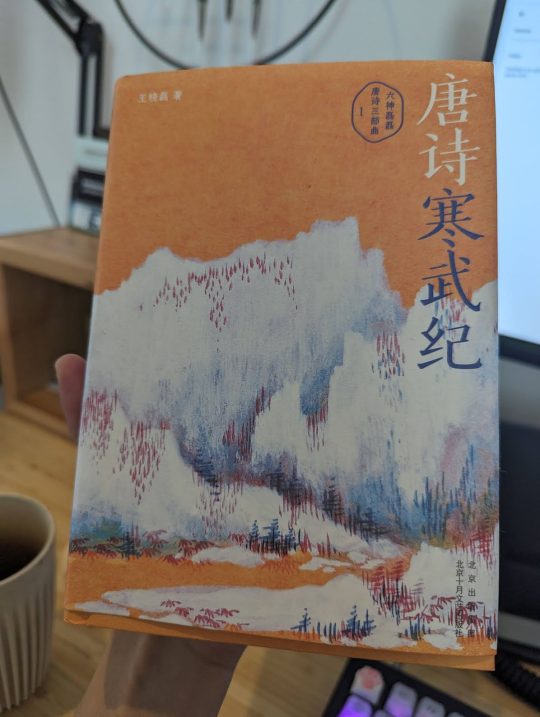
I just wanted to translate a lil' bit of this book I was reading, because I didn't realise just how many poems (in the case of this book, Tang dynasty poems) have been lost to the ravages of time, and what a miracle it is that we even have a 唐诗三百首 today. Short note from me about translation approach is at the end under the cut.
唐诗寒武纪
王晓磊 (六神磊磊) 著
ISBN: 978-7-5302-2250-8
The Cambrian Age of Tang Poems by Author Wang Xiaolei (ISBN: 978-7-5302-2250-8)
Chapter 1
Do you know how fortunate you are to be able to read Tang poems today?
我志在删述,垂辉映千春。- 李白
My ambition is as grand as when Confucius compiled The Book of Poems, so that the radiance of my poems may shine a thousand springs from now.
At a time 400 years ago from the present day, during the Tianqi Era (1621-1628) of the Ming Dynasty, when Eunuch Wei Zhongxian’s (魏忠贤)authority could eclipse the heavens-
In the Haiyan district of the Zhejiang Province, there was an old man who silently shed his official’s robes, and folded them neatly. This was a set of blue robes embroidered with white pheasants, signifying that he was a fifth-rank court official.
Outside, someone yelled, “Official Hu, why haven’t you come out yet! We’re waiting to escort you to De Zhou so you can take up your post there!”
“Take up my post?” The old gentleman gave a small smile, then muttered to himself, “Goodbye, court politics! I have long grown weary of you. I’m going back to my hometown, and spending the rest of my years completing a very important matter- to compile the most complete set of Tang poems, so that there will no longer be any left out, so that no longer will there be any lost to the ages, so that our descendents can read them all!”
Let us remember the name of this old gentleman: Hu Zhenheng (胡震亨).
Perhaps it is very difficult for people of the present day to understand - wasn’t he just wanting to make a compilation of poems, was that really so difficult? Did he need to really go this hard? Actually, yes. Back in that time period, it really was that difficult. During that time, there were no publishing companies, printing factories, libraries, or convenient search engines. If you wanted to look up a poem, you’d have to pore through countless scrolls, you may even need to trek over mountains and cross rivers just to be able to make a copy - and even after all that, you may not even have been able to make that copy.
If Ol’ Hu slacked off, and didn’t make this Tang poetry compilation, what would have happened? The answer to that is, that the consequences would have been very dire.
At that time, Tang poetry was already starting to go extinct just like how our flora and fauna species are going into mass extinction today. According to Hu Zhenheng’s estimations, at least half of all Tang poetry had already been lost.
Perhaps you are thinking, how the hell does poetry just go missing? As long as the poet is good enough, as long as the poem is good enough, then wouldn’t such works just be passed down through the ages, and be able to endure, that way?
It really doesn’t work like that.
Let me ask you a very broad question: out of all of the Tang poems, which one is the best? Perhaps many people will respond, off the top of their heads, “A night of moonlit blossoms on the river in spring” (春江花月夜“). This poem is lauded as the “a singular page eclipses the entire Tang dynasty” poem of poems, after all. Well then, who is the author of this fine poem? Many of you readers can answer, Zhang Ruoxu(张若虚).
This Mister Zhang has written such a great work, and has made such a great contribution to Tang Poetry. Well then, how many of his poems remain today? A hundred poems? Eighty? The answer will shock you - merely two of his poems remain today.
The only reason “A night of moonlit blossoms on the river in spring” was able to be passed down to the present day, is really nothing more than a giant fluke. It was thanks to a very accidental opportunity, that when people in the Song dynasty were compiling a book of songs and ballads for their music bureau, they recorded this very poem by Zhang Ruoxu into the compilation, and enabled it to be passed down through the ages.
Apart from two poems, all the other works created by Zhang Ruoxu in his lifetime, do not exist today.
Now let me ask you another similar question: out of the pentasyllabic quatrain poems (五言绝句)in the Tang dynasty , which one is the best? Many will immediately respond, “Climbing White Stork Tower” (登鹳雀楼). Yes, the one which everyone recited as a child - the sun sets against the mountains, the yellow river flows into the sea” (白日依山尽,黄河入海流). Its author is recognised by most people as Wang Zhihuan (王之涣).
So then, how many poems has the great poet Wang Zhihuan left behind? The answer will again flabbergast you as you read it: there are only six poems left behind, the rest are all gone.
Within a thousand years, we do not know how many lines like “the sun sets against the mountains (白日依山尽)”, and “the tides of the ocean and the moon rise in tandem (海上明月共潮生)” have been lost to the ages forever.
The misfortunes of our friends Wang Zhihuan and Zhang Ruoxu, were not mere happenstance.
How many poems of Li Bai (李白)have lived on to see the light of today? The most pessimistic takes say that, about one-tenth of all his poems exist today.
This great genius has been writing poetry all his life, so estimates of his total poem count sits at around five thousand to ten thousand poems. For every ten of his poems, we may never ever be able to read eight or nine of them.
Before passing away, Li Bai had sorted out all of the drafts and writings he had made in his lifetime, and solemnly entrusted it all to his uncle (族叔), Li Yangbing (李阳冰), and asked that he compile them into volumes, so that it can be passed down through generations. Li Yangbing did not fail Li Bai’s wishes, and poured his heart into compiling the Thatched Cottage Anthologies (草堂集)of which there were ten scrolls … which then subsequently got lost to the ages in the Song Dynasty.
Now let’s talk about Du Fu (杜甫)。Essentially all the poems written by this similarly great poet before the age of forty, have been lost to the ages. How long did Du Fu live? Until age fifty-eight. That is to say, that all the poems he wrote for most of his life, were all for nothing.
Another big shot, Wang Wei, (王维)fared no better. During the Kaiyuan era alone (713-741) he wrote hundreds if not thousands of poems. By the end, less than one-tenth of the total remained.
There are countless other examples. The early Tang poet, Song Zhiwen(宋之问)was big-name poet who established the foundations of regulated verse poetry. He had poetry volumes circulating during the Tang Dynasty, however the circulation still ended during the Jiajing era of the Ming dynasty, and was finally lost during the Wanli era. All twenty volumes of the writings of gifted female scholar-official, Shangguan Wan’er (上官婉儿), were entirely lost in the Song dynasty, and we only have thirty-two of her poems remaining today.
The poetry volumes written by one of the “Elite Fours” of the early Tang dynasty, Wang Bo (王勃),the genius who famously wrote “the hues of twilight fall in line with the solitary flight of a wild mallard (落霞与孤鹜齐飞)”, were arduously able to survive for a few hundred years, however, come the Ming dynasty, they were all completely lost all the same.
This is like saying that the complete works of Jing Yong (金庸)were all lost to the ages, and you would only be able to glean snippets and excerpts of his original writings from the column writings of Liushen Leilei (六神磊磊)to get your hit. Just the thought of it makes me want to cry.
The great Meng Haoran (孟浩然) can be counted as lucky. Shortly after he passed away, there were already people making compilations of his poems. Even so, many of his creations have still been lost. There is also the great Li Shangyin (李商隐), who wrote “the silkworm spins silk even ‘til death (春蚕到死丝方尽)” and “our hearts are connected through a singular nexus (心有灵犀一点通)” , who personally compiled forty-odd scrolls of his writings, however, those have all been lost, and not a single volume remains. His poems have all been scrabbled together piece-by-piece, by those after his time.
So, do you still think that those poems which have been lost to time, were lost purely because they were shoddy poems, of little worth, so no one wanted to remember them? Not at all. Even if they made a mark in their heyday, poems that are handed down will eventually be lost to time, all the same.
People in the Tang dynasty have recorded, that of Li Bai’s CiFu (辞赋)poetry, the poems Dapeng Fu (大鹏赋)and Hongyou Fu (鸿猷赋)were incredibly marvelous, so much so that they even surpassed the calibre of writings of the big guardians of CiFu poetry from the previous generation, Sima Xiangru (司马相如) and Yang Xiong (杨雄). Fortunately, we can read Dapeng Fu today, but … where is Hongyou Fu? Sorry, it’s gone, lost forever to the ravages of time.
Translator’s note:
There are many ways to do a translation, and this one is more for the vibes than for the “literal” translation - that is not to say it is inaccurate, but as someone who has translated for years from Japanese to English, or from time to time, Chinese to English (when I feel like it lol) I thought I’d state the purpose of this translation so you can get a sense of my choices here. I am translating this very casually and more for speed / for fun, it is a very pulling-words-off-the-top-of-my-head translation than the other kind of translation I do where I sit there for hours milling over a singular word. A partial reason for why I can do this style of translation is because the prose of the book itself is very conversational and casual (I will tangentially note, this writing style is kind of controversial with the Author’s other works that discuss poetry, as some readers view it as “low-brow”, but for me, I like it. I think it makes the content very digestible and accessible to readers who are new to poetry). This translation is for my buddies in the poetry club, who are mainly diaspora and/or can read Chinese to any extent anyway (in particular, I want to thank the funny and great @fwoopersongs, for always being here to chat poem stuff and making me interested in the lives of the poets and the context surrounding the poetry rather than just the poems themselves). As such, I will try to remember to include the Chinese characters for people’s names, so you can read it with the correct tones. I bought this book and started reading, and thought wow, this is cool, I want to share it. A lot of the Chinese terms here I’ve only thought about and experienced in Chinese, I don’t watch Mandarin-language shows with any subtitles, and I don’t typically experience other Chinese Media in English so I am not sure what the “standard” (if any) terms in English would be - it’s for the vibes, especially the parts where I am translating literal poetry. For example, the author pulls verses from poetry here to set the tone for the start of a chapter, so the goal of my translation here to make a translation that it conveys to the reader a reason why that verse was chosen, rather than the “perfect” way 千秋, 碧落,独倚 or a word like that is translated (or, for example, everyone let’s agree on a translation of the poem title 《春江花月夜》 - pain - lol). I do not think I can do any of these poetry translations justice, as poetry translations in any language is more like a feeling of the soul that you try to fit within the available confines of another language, hoping that the reader on the other side can experience something in their own individual way through your shared humanity rather than language alone. Also, I do have a lot of commentary and notes that I wanted to make but I might do that in a different place (maybe as footnotes) at another time, I don’t want to interrupt the flow of the reader by sticking my own comments everywhere.
#Chinese Poetry#anyway wow i got to 心有灵犀一点通 and I had Instant Regret that I thought Id translate any poetry yanno wow wsl#ponz translates#i mean im not about that life anymore but sometimes i feel like it#心血来潮zuo一下#you don't need to follow me for anything there is no consistent content on this chaotic blog#im just vibing with friends and watching dramas that catch my fancy
53 notes
·
View notes
Text
[CN] MLQC Lucien's Arriving As Promised event translation (Prologue + Day 1)
⚠️ SPOILER ALERT ⚠️
This post contains a HEAVY SPOILER for the event that has not been released in EN yet! Feel free to notify me if there are any mistakes in the translation~
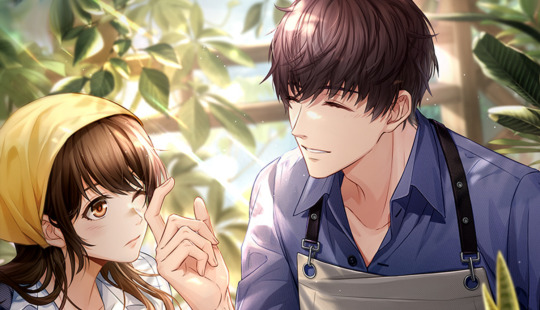
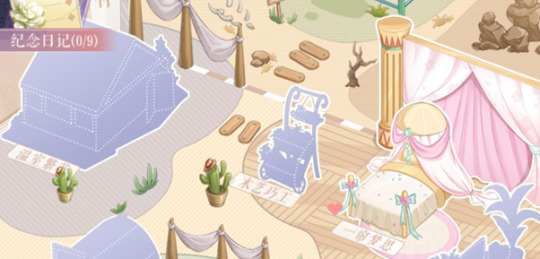
Arriving As Promised Free SR Event | Prologue+Day 1 | Day 2 | Day 3 | Day 4 | Day 5 | Day 6-9 | Warm Fragrance Date
Translation under the cut!
Translation under the cut!
[Note]: This is a FREE SR event, so it’ll take 9 days to get the karma. The event’s ‘name’ is actually longer but I decided to shorten it bc it’ll be long af if I wrote all of it 😂.
The event’s full name is 如约而至生如夏花 which translates to “Arriving as promised, life is like a summer flower”. “Life is like a summer flower” (生如夏花) symbolizes the ephemeral and transient nature of life, comparing it to the fleeting beauty of a flower that blooms during the summertime. This phrase might be a reference to one short poem in [Stray Birds] written by Tagore. The full phrase of the referenced short poem is “Let life be beautiful like summer flowers and death like autumn leaves.”

[Prologue]

The golden desert stretches out flatly towards the distance, connecting undulating dunes. The wind freely brushes against this desert.
In front of me, Lucien crosses a gully filled with quicksand. He stands on a dune, turns around, and reaches out his hand towards me.
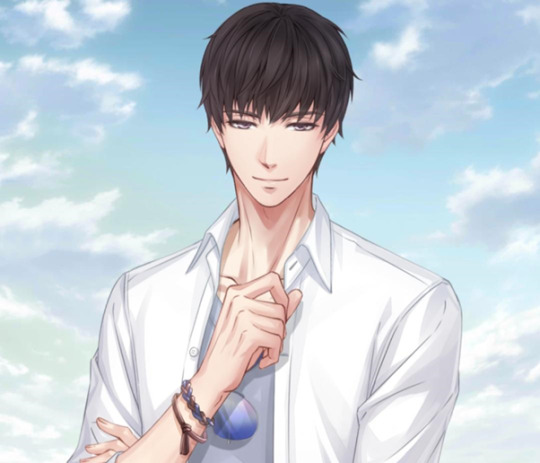
Lucien: Give me your hand.
He grabs my hand, and I follow his large strides, stepping steadily onto the sand dune.
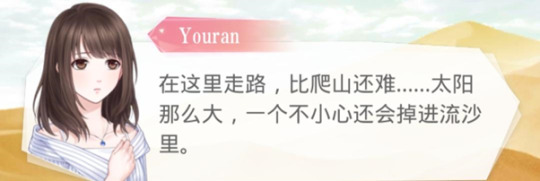
MC: Walking here is even more difficult than climbing a mountain... The sun is so intense, and one wrong step could lead to sinking into quicksand.
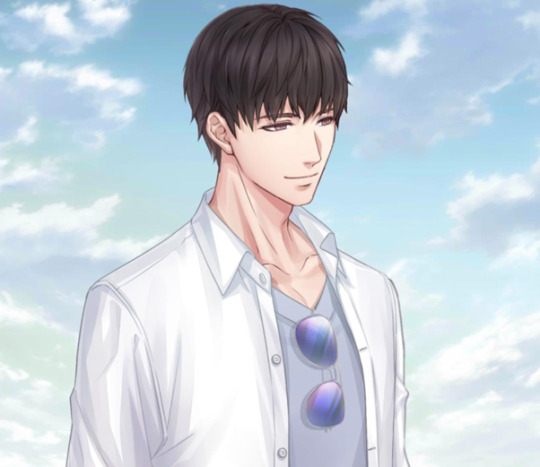
Lucien: That’s why the residents here prefer to travel by camel for convenience and safety. Occasionally, they also take public off-road vehicles.
MC: Are you also going to ride a camel or take a public off-road vehicle to the research institute later?
Lucien: The research institute doesn’t allow external vehicles to get inside the enclosed experimental area, so they will come to pick me up at the waiting shelter later.
MC: It’s good that someone will come to pick you up~
Lucien was invited by the Great Western Neuroscience Research Association to come to this desert town and study the frequent occurrence of brain diseases among desert residents and its connection to the scarcity of vegetation.
I heard they also have a large experimental greenhouse. It sounded intriguing, so I took the opportunity during my vacation to come here with him.
I had initially thought that, like before, we could explore around after he finishes work. However, I didn’t expect it to be completely closed off and tightly managed.
MC: After your experiment is over, can we go around nearby?~
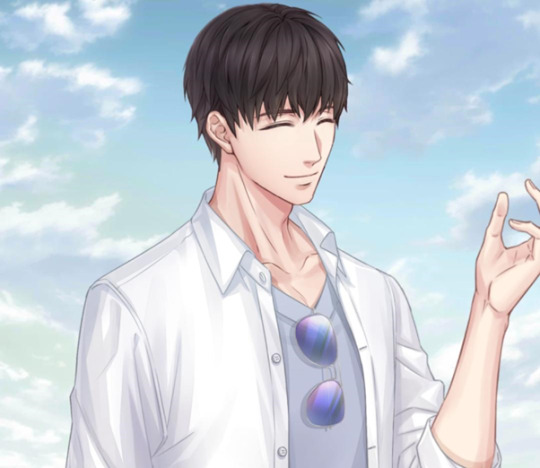
Lucien: Of course, there have been many local events recently that showcase the unique characteristics of the area. I think you will find them interesting.
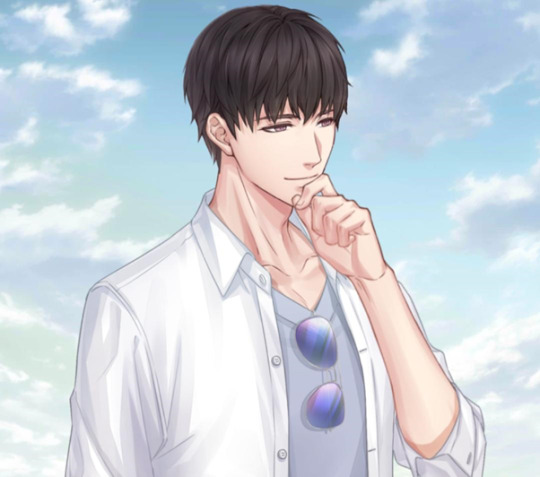
Lucien: However, after the closed experiment is over, I still have a day of running the flower shop as part of the experiment.
Lucien: So, I will have to ask you to wait for me for one more day.
Lucien: However, if you’re interested, I would also be delighted to welcome MC to my “garden.”
MC: Can I go too?!
Lucien: By that time, the experiment should be in a phase where it is open to the public.
Actually, whether we go to the flower shop or not is not important. Being able to see him sooner is already enough for me.
However, just the thought of Lucien as a flower shop owner makes me can’t help but smile.
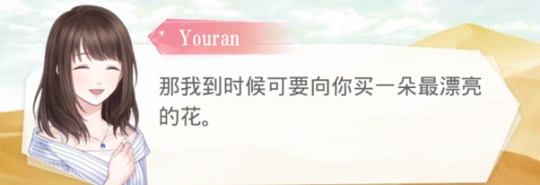
MC: Then I will have to buy the most beautiful flower from you when that time comes.

Lucien: Perhaps ‘Shop Owner Lucien’ will prepare some special gifts in advance for someone he likes.


As we cross the final gully of quicksand, the waiting shelter finally comes into view.
Lucien's phone starts ringing almost simultaneously.

Lucien: The research institute’s vehicle has already departed. They said it will arrive in about fifteen minutes.
Lucien: Don’t worry, my colleague’s car will come later to take you to the hotel.

MC: Oh...
Although I know that this is a normal part of Lucien's work and have prepared myself for it, I can’t help but feel a bit disappointed as we part ways.
I won't be able to see him for over ten days from now on.
I quietly pout my lips and step forward, wrapping my arms around his waist and burying my face deep in his embrace.

Lucien: There are still ten minutes left. Don't you want to talk to me a bit more?

MC: ...Remember to drink plenty of water. It's easy to get dehydrated in the desert.
MC: No staying up late secretly doing research, and no forgetting to eat because of meetings.
MC: If you go out, always remember to wear a hat. Don't get heatstroke.

Lucien: Then, MC, would you like to lift your head and listen to my answer?
A laughter-filled echo that comes from above reaches my ears. I pause for a moment and lift my head up.
And at the moment I lift my head, a sensation of intimate warmth lands on my lips.
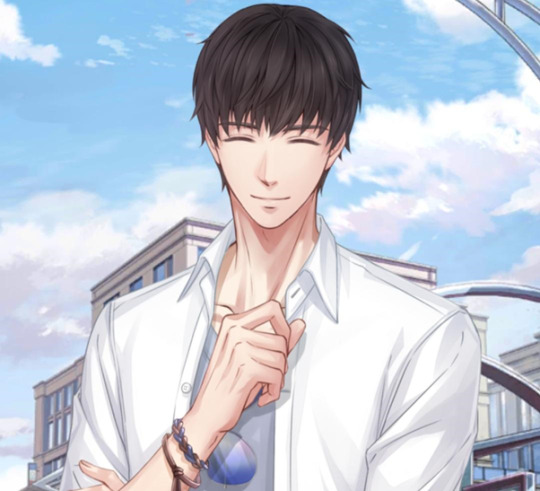
Lucien: I don't remember any of the things you just said, what should I do?

MC: Liar.
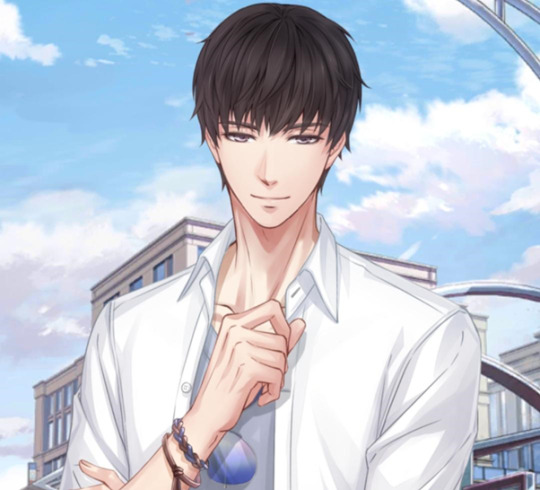
Lucien: Because all I can think about right now is you, I can't remember any other unnecessary things.
A restrained sigh resonates in my ears, and as if unable to hold back, he lightly pecks me once again.

MC: Then I will make sure to write it down specifically so that you can't use the excuse of "thinking about me*" to avoid resting.
[T/N]: 想 is to think of/to miss someone/something.
I rummage through my backpack and earnestly start writing with pen and paper.
Seeing the words I wrote, Lucien strokes my head gently, his gaze softening.
Lucien: Then, I have one for you too.
[To Do List, From Lucien to MC]
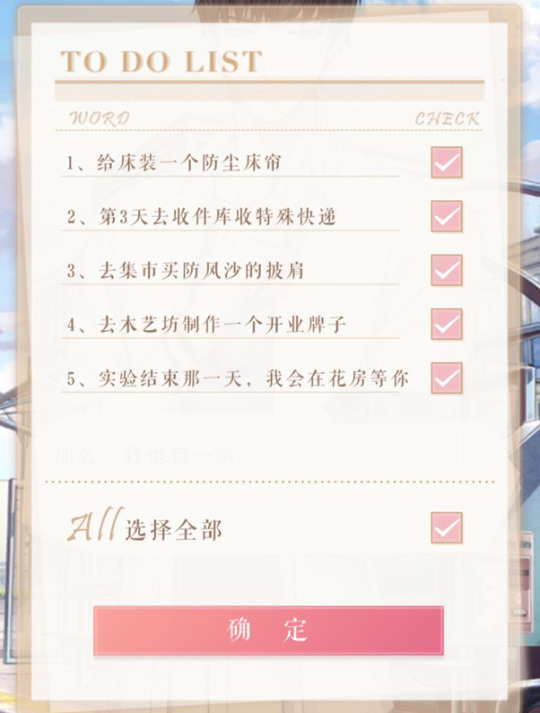
Install a dust-proof bed curtain on the bed.
On the third day, go to the warehouse to collect a special package.
Visit the market to buy a windproof shawl for sand protection.
Visit the woodworking workshop to make a grand opening sign.
On the day the experiment ends, I will wait for you in the flower shop.
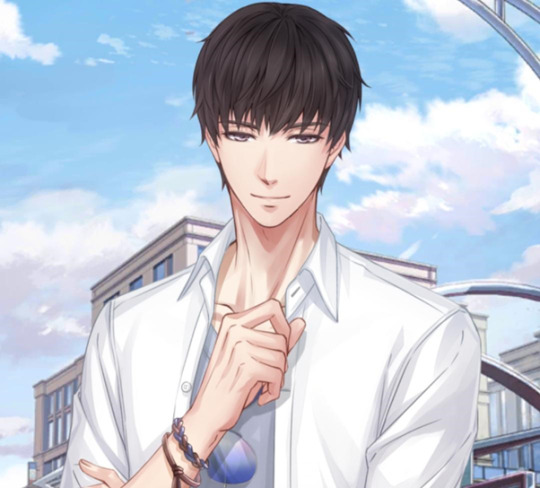
Lucien: Only one minute left, I want to use this last minute to hug MC again.

[Day 1 – A curtain of dreamy longing]

After the long journey through the desert, I finally arrived at the garden villa near the oasis.
MC: I didn't expect to find such beautiful accommodations in the desert!

MC: It’s a pity that such a spacious place is only for me to stay in alone.
MC: I wonder if Lucien has arrived yet...
I originally want to give him a call, but then I remember that he will have a meeting after arriving at the laboratory.

MC: I’ll call him later then.
I suddenly remember that Lucien also left me a note before he left.
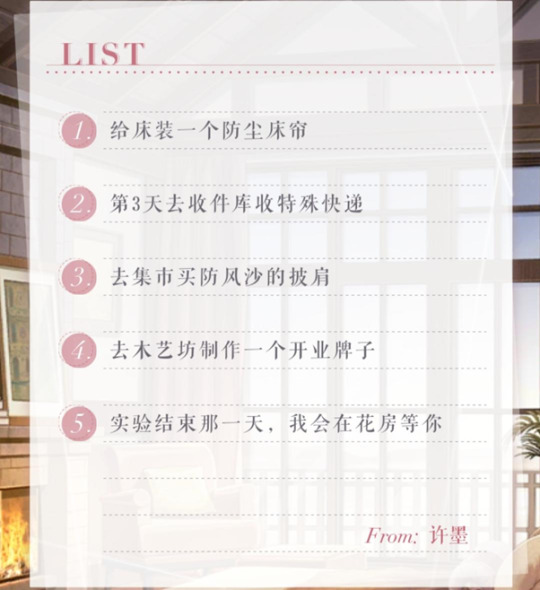
MC: After putting away my luggage, I’ll go to the supermarket to see if they have any dust-proof bed curtains.
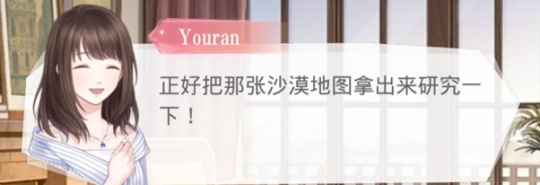
MC: It's a good idea to take out the desert map and study it while I have some time!

[Diary]
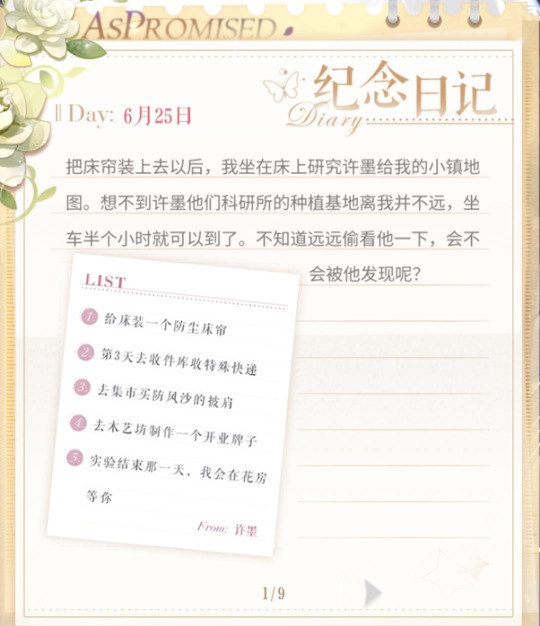
Day: June 25th
After installing the bed curtains, I sat on the bed and studied the small town map Lucien gave me. Surprisingly, the research institute’s plantation base is not far from where I am, just a half-hour drive away. I wonder if he would notice if I sneak a glimpse of him from afar?
#that any other unnecessary things is crucial for your life SIR#the longing and yearning :"#the way they stay clingy until the last minute until getting separated sob sob#mlqc lucien#mr love queen's choice#mlqc spoiler#mlqc translations#mlqc cn
33 notes
·
View notes
Text
No! ~ Tommy Shelby Angst

Summary: The many times Tommy Shelby should have said no and the one time he wished Charlie wouldn't have.
Note: This my contribution for @sunsetmourners 300 follower celebration. Congratulations on three hundred followers and thank you for hosting this wonderful celebration!
I chose to write something based off of the poem Dann gibts nur eins! by Wolfgang Borchert. As it is a German poem, I've written an English Translation in case anyone's interested. I bent the rules a little bit - it is not based on my favourite poem, but one of the most important ones I've ever read. Even though, it is not very celebratory or light hearted, I hope you enjoy it all the same.
I do not consent to my work being translated, copied or posted elsewhere on this platform or any other. This hasn't been beta'd so I apologise for typos or mistakes. Here is my Masterlist.
Warning: Mention of war and death. As I am an adult, all my writing I share is unless explicitly stated for adults (18/21+). Expect canon confirming tone. Your media consumption is your own responsibility.
Request: @sunsetmourners 300 follower celebration
Wordcount: 809 words
When he had been a boy tending the horses in his uncles stables and his best friend wanted to tell him what the Russians and the Austrians and the independence of nations meant for him he should have said no.
When the army had sent people to the city hall to explain the effort and the need, to talk of patriotic duty and the heroes they would become - to tell them why he should exchange brush for gun and hoof pick for shovel, he should have said no.
When his brothers had made their vow to join him in his futile quest to leave his broken heart behind, offering to leave their homes and cross the sea at his side, he should have said no.
When they told them that they would be most useful underground, digging tunnels and laying traps, catching the Germans off guard to save thousands of British lives, he should have said no.
When Churchill wanted to use his hands to force those of the Irish and the King and offered him export licenses in exchange, he should have said no.
When they had flaunted the money in front of him - 100 000 pounds, all for some weapons in some distant war in some place no one gave a fuck about, he should have said no.
When his factories were offered a government deal to manufacture arms instead of car parts, he should have said no.
When Churchill saw the use in him spying on Molesley, gathering information from the inside out, he should have said no.
When Molesley asked him join him at an event, to speak to electorates in this city, his city, who looked up to him, he should have said no.
When he was asked to facilitate contact between the British fascists and the American ones just so he could keep Churchill informed, he should have said no.
But he hadn’t. Not even once.
Money and greed, imagined necessities and momentary desires had blinded him- but had he any right to claim blindness?
Tommy knew the answer.
He had known and done it all the same, in spite of the countless warnings.
And now, Thomas Shelby couldn’t even look at them.
He could not look at his son, his boy, the one he held in his arms all throughout his first night in this world, whom he clung to when the world fell apart and whom he let go when he felt the noose tightening around his neck.
This was it now, the reckoning, the price for his sins and he knows it.
Tommy also couldn't look at Lizzie, Lizzie who hadn't known, and yet fought like she had.
He did not have a right to look at her, the same way he had no right to call her his. Beautiful, brave Lizzie, who was better than he was, than he had ever been.
Lizzie, who had faced the coming storm with stoic silence and a fiery determination, who had locked herself in her office and read every last publication from the war office, every pamphlet, every page of every parliamentary decree - everything in search of an answer.
She hadn’t stopped, not to eat, not to sleep, not until she read every last option, knew of every single loophole and could explain even the most obscure alternatives.
She had presented them one by one, like pitching a business proposition, wrapped in soft words of heroism, for what could be more heroic than the study and pursuit of saving lives instead of taking them?
She talked of family, and how he could take up a place in the management of the factories, produce ammunition instead of fire it. Or if that was not to his liking, perhaps the shipping and the cars, everything relied on movement, of goods and weapons and men and those that managed it were indispensable.
She offered him a position in the foundation, in the same part she worked in where they made sure to evacuate as many people, as many children as possible out of the cities.
Every single option, every single post a chance to make him essential - everything, anything, that would keep him away from the front lines, on the ground, at sea or in the air.
As if any other son was less essential- any other father or brother.
She presented them calmly, logically, the desperation in her heart only shining in her eyes but she did not allow it to affect her voice.
All the while, Charlie had listened, taking in each and every option she presented to him - patiently, ardently.
Thomas Shelby had hoped against hope, even though he had no right to, but he knew their son’s answer before spoke, as soon as Charlie got up and took Lizzie’s hands in his.
"I'm sorry Mum,”, he said softly, “but no."
End.
~
Thank you for reading! I’d be very grateful for feedback of any kind! If you are interested in more, here is my [Masterlist].
@sunsetmourners I hope you enjoyed my contribution to your challenge.
Taglist:
@lilyrachelcassidy @jyessaminereads
#tommy shelby fanfic#tommy shelby fic#tommy shelby imagine#thomas shelby fanfic#thomas shelby fic#thomas shelby imagine#thomas shelby#peaky blinders#peaky blinders imagine#peaky blinders fanfic#tommy shelby#Thomas shelby#valentineswritings#sunsetmourners 300!#No!#Lizzie Shelby#Lizzie Stark#Charlie Shelby#Charles Shelby#Elizabeth Stark#Elizabeth Shelby
180 notes
·
View notes
Text
Analysis of Tian Ya Ke Lyrics
(line-by-line with literary references and context)
Analysis: Weibo user 认真看剧的打字机器 (original Weibo post)
Translation: keishi, first posted on Twitter @_keikaku
Full text is also available here. Long post warning!
Tian Ya Ke, being Word of Honor’s ending theme, has appeared in many important scenes throughout the show. Moreover, the lyrics were penned by the script writer herself, thus it can best express the show’s overarching idea, much worthy of a detailed analysis.
[Part 1 - ZZH]
天苍苍事了功成渡寒江
Under the grey sky, I crossed the cold river as the job was done
Meaning: The deep blue sky was vast and endless, ZZS’s service as Tianchuang’s leader under King Jin had come to an end, and he was about to cross the cold river to leave the Northwest region.
Analysis: “Cold river” points to the river water during the autumn and winter, in this context it points at ZZS leaving the Northwest in a very cold and harsh winter. A line from Jet Li’s (Li Lianjie) Flying Swords of Dragon Gate can also be aptly quoted here: “A lone silhouette on the cold river, an old friend from jianghu”, which accurately portrays ZZS’s current state.
夜茫茫杯中月影笑荒唐
In the vast night, the moon in my cup laughed at the absurdity
Meaning: The vast darkness of the night, whose ends were nowhere in sight, there was only the reflection of the moon in my cup, laughing at my years of living in absurdity.
Analysis: “The moon’s reflection in my cup” comes from Li Bai’s Drinking Alone Under the Moonlight - First. In this poem, the author experienced an extreme sense of loneliness —— “Pouring out a cup, for no friend or kin” (WKX has also quoted this before), so he decided to take the moonlight and his own shadow as drinking companions, “Raising my cup to invite the moon, with my shadow we made three people”. In the lyrics, the moonlight is personified, purpose is to express ZZS’s solitariness at this point, where he can only find company in wine and the moon, and he mocks himself for self-righteously believing that he was sacrificing for the greater good, while in fact, it was just a preposterous case of feeding himself to the tiger.
谁许我策马江湖闯四方
Who allowed me to gallop off to traverse the world?
Meaning: Who can accompany me to travel the world on our horsebacks?
Analysis: A complement to the solitariness in the upper sentence, lamenting about how there’s no one around ZZS who can accompany him to fulfill his wish of galloping off around the world.
谁醉遍天涯 梦醒不见故乡
Who had travelled to the ends of the world in drunkenness, yet couldn’t face their hometown when sober?
Meaning: I can go to the ends of the world and the corners of the four seas to drink wine, but I can never return to the hometown that I dream of going back to.
Analysis: “Wandering the world, drinking to death” is not in ZZS’s romance, but the last punishment that he gives himself. There’s an old saying, “falling leaves return to their roots”; it’s also a traditional mindset of “even if I’m dying soon, I want to die in my hometown, where my roots are”. Even the most highly regarded, powerful court officials also requested to “bring their bones and ashes back to their hometowns” upon reaching their old ages. Du Fu, the God of Poetry, died on a boat heading back to his hometown. ZZS is aware that the countdown on his life has already begun, so he can’t not be thinking about returning. “Couldn’t face their hometown when sober” actual meaning isn’t “sobering up from the wine”, but rather “only can see the hometown in their dreams”, which hints to us ZZS’s reminiscence of his home. However, ZZS is set on believing that he has let down his teacher/forgone the teachings imparted in him, thus feels ashamed to face Siji Manor. Despite clearly having hometown on his mind always, since the departure from the Northwest, he leaves Kunzhou in the Southwest and heads towards the Southeast (Chengling’s home is located in the now-Zhejiang region). This kind of nomadic life, though the heart yearns for a place he can’t return to, is also one of the final punishments ZZS gives himself.
(Which is also my reasoning against hobo-Xu = freedom… he isn’t just drinking wine… he’s using wine to numb the pain in his flesh and mind…)
Summary of Part 1: The first sentence describes ZZS’s current state, the second sentence describes ZZS’s sorrow about his ideals destroying half of his life, the third describes ZZS’s loneliness, the fourth describes his yearning for home.
(Between these three types of emotions, just experiencing one is already torturing enough, yet he’s experiencing all three at once, how can he feel happy…)
[Part 2 - GJ]
西陵下凄秋凉雨吻我窗
Under the dreary autumn sky of Xiling, cold rain kissed my window
Meaning: In the middle of Ghost Valley, there was only desolating autumn rain landing on my window.
Analysis: This sentence comes from Li Shangyin’s The Tomb of Su Xiaoxiao: “Under the Xiling sky, winds blew at the falling rain”.
This poem by Li Shangyin was one of his “ghost poems”. Through the imagery of Su Xiaoxiao’s tomb, he drew up a series of strange illusions, portraying the beautiful yet fleeting ghost of Su Xiaoxiao, thus creating a resplendent but ghostly atmosphere. It bodes well with Wen Kexing’s image in the Ghost Valley: an outstanding beauty with dark and terrifying aura. And although Wen Kexing sits at the highest position of power, there is only the cold autumn rain knocking on his window, illustrating his inner feelings of loneliness and desolation.
(T/N: The author, whose writings were dubbed as “ghost poems” was actually Li He, a poet from mid-Tang dynasty, and not Li Shangyin, a poet from late-Tang. Likely a typo on OP’s part.)
任人憎任人谤 未妨惆怅是清狂
Let people hate, let people slander; but perhaps melancholic “clear madness” will do no harm
Meaning: No matter how others hated me, slandered me, I always persisted with my own desire, without a care for people who said that I was obsessed.
Analysis: “But perhaps melancholic ‘clear madness’ will not do any harm” comes from Li Shangyin’s Untitled Twin Poems. The full line reads, “You may say that it is completely futile to be lovesick; But perhaps melancholic ‘clear madness’ will not do any harm”. However in this context, this part has no relation to lovesickness; we must interpret it in tandem with the former part in the lyrics “let people hate, let people slander”. It conveys WKX’s mental state during his time in Ghost Valley: although hated or slandered by the so-called righteous sects, WKX has never quite cared, and in a state of near-obsession, he step-by-step makes preparations to avenge his parents. Despite deeply knowing that in doing so, he will end up sacrificing himself/can’t step away when it ends, he still wants to go absolute bonker, using the complete destruction of jianghu as a way to return justice to his parents.
春风吹得绿江南水岸 吹不暖人心霜
Spring breezes blew greens to the banks of Jiangnan river; couldn’t blow warmth to a frosted heart
Meaning: Spring winds could bring back luscious nature, but couldn’t melt the frost and coldness in my heart.
Analysis: The first half comes directly from Wang Anshi’s Anchoring At Guazhou. The poem continues, “when would the bright moon shine on my way back home”. Here, the “spring breezes” refers to the spring day of WenZhou meeting, at which point WKX’s heart is still a block of icy frost, but in actuality, he begins to yearn for a bright moon to bring him home, thus the latter half in the lyrics.
猝不及防 那是不是我们的光
Taken by surprise, could that be our light?
Analysis: The bright moon whom WKX yearns for, the bright moon who will bring him home, right on that spring day in the 27th year of his life, he comes in all glowing light, and barges into WKX’s world unannounced.
Summary of Part 2: The first sentence describes WKX’s current state, the second sentence describes WKX’s mental state, the third sentence describes WKX’s yearnings, the fourth sentence describes the effect of WenZhou’s first meeting on WKX.
[Part 3 - GJ]
相见恨晚幸未晚 不再辜负四季花
Hate that we couldn’t meet sooner, happy that it wasn’t too late. Flowers of four seasons no longer bloomed in vain
Analysis: WKX meets ZZS well into his adulthood, at the age where most people celebrate early life achievements, so it can’t be considered late. The fortunate part is, he meets ZZS where he considers to be “near the end of his life”. He then finds his own redemption and is able to live on, that’s why “it wasn’t too late”. “Flowers of four seasons” refers to the beautiful sceneries of Siji Manor: “Spring bathes in a sea of azalea, summer appreciates blooming phoenix flowers, autumn comes with wafting red osmanthus fragrance, winter beholds snow-like plum blossoms”. It also signifies WKX slowly letting go of his obsession to destroy the world after meeting ZZS, breaking free from his vengeance, and learning to admire the everchanging sceneries of four seasons along the journey of living – from then on, the beauty of ever-blooming flowers along the path of life shall not go unnoticed. And it marks the development from “as long as I can burn down this murky water of a martial world and its so-called righteous sects, there’s nothing that I can’t risk” mindset to “as long as we let go of vengeance, we are alive and living”.
将古道西风瘦马 换小桥流水人家
Trade away the old road, autumn winds and scrawny horse, for a small bridge, running stream and a home of nestling
Analysis: This line comes from Ma Zhiyuan’s To the Tune of “Tian Jing Sha”: Autumn Thoughts. Its meaning complements “Flowers of four seasons no longer bloomed in vain”, referring to WKX’s change of heart after meeting ZZS, from a painful and desolating “thin horse trudging on an old road in the autumn winds” to a warm and lively “nestling homes over a small bridge by a running stream”.
(T/N: Tian Jing Sha (lit. Sky-Clear Sand) is the name of the tune to which this qu poem is composed (曲牌名 qubaiming), that is to say, in an oral performance, this poem is intended to be recited with the rhythm and melody of Tian Jing Sha. The english for this line is rehashed from Andrew Wong’s translation.)
Summary of Part 3: In the first sentence, WKX expresses his good fortune of having met ZZS, through which his life is no longer engulfed by vengeance. In the second sentence, he describes the change of heart after meeting ZZS.
(Plainly speaking, he’s just declaring his love to ZZS: “only after meeting you that I realise how important you are to me”)
(…Okay, enough already Wen-ge)
[Part 4 - ZZH]
万里河山万家灯 往事如烟浪淘沙
A thousand miles of rivers and mountains, a thousand lights of homes. The past went up in smokes, washed away like sands
Analysis: “A thousand miles of rivers and mountains” comes from Xin Qiji’s To the Tune of “Qing Ping Yue”: Sleeping Alone in the Wangs’ Hut under Mt. Bo, referring to the vastness of the world. “A thousand lights of homes” is from the Qing dynasty’s novel A Flower In A Sinful Sea by Zeng Pu. Here’s the full line: “A thousand lights of homes, a path lined with songs of the flute”, describing the warm scenes of houses lighting up one after another as the night falls.
“Lang Tao Sha” (lit. waves washing away sands) is the tune title. I initially thought it refers to “great waves washing off the sands”, but the meaning of this phrase is “to stand the test of ferocious battles”, which clearly doesn’t match the context. So I made a bold guess that Liu Yuxi’s Lang Tao Sha was quoted here: “With many turns the Yellow River flows with sands from afar; Coming from the sky's edge, the wind-blown rolling waves never stay”. This matches the sentiment expressed in “(the past has) gone up in smokes” to convey the idea of “no going back”, like muddy sands swept away by the past.
In this line, ZZS is consoling WKX, telling him to treasure the beautiful sceneries and the warmth, homeliness of the mortal realm. Let bygones be bygone, don’t torment yourself over the past.
将平生霜雪 与君煮酒烹茶
Use my life’s worth of frost and snow to warm wine and brew tea with you
Analysis: Wine is warmed by submerging a flask of wine in a hot water bath. This scene took place once before, when WenZhou were at the Siji Manor. Tea brewing is exactly how it’s normally done. However, both of these activities are considered refined hobbies to be enjoyed in the tea stove I brought along; A life free of worries was a hundred years well-spent”. In Dream of the Red Mansion Part 41, as Miaoyu was making tea for Baoyu, Daiyu asked, “Is this rain water from last year?” Miaoyu sneered, “A person like you is such a boor, that you can’t even differentiate water when you taste it. This is snow collected from the plum blossom, when I was at the Panxiang temple in like the heroes i It’s apparent that despite being “rootless water”, melted snow is considered a grade aboThree Kingdoms, drinking warm wine with green plums. ZZS is expressing his desire to live rainaater.20the use of melted snow to make tea would greatly enhance the elegance and appeals of this lifestyle.
Yet, to warm the wine and brew the tea with “my life’s worth of frost and snow” just adds a whole other layer to the depth of emotions. There’s a saying, “good tea must be brewed in good water”. Which water is the purest, the most elegant of them all? The ancients believed that crystal-clear and sweet water was of the highest quality. Tea brewed from water that has once been frozen yields an extraordinary taste. In Bai Juyi’s Rising Late: After A Morning’s Slumber, “Melting snow to brew fragrant tea, melting butter to make porridge”. Lu You wrote in Tea After Snow: “Sweet and clear liquid snow filled my well, simply brewed with the tea stove I brought along; A life free of worries was a hundred years well-spent”. In Dream of the Red Mansion Part 41, as Miaoyu was making tea for Baoyu, Daiyu asked, “Is this rain water from last year?” Miaoyu sneered, “A person like you is such a boor, that you can’t even differentiate water when you taste it. This is snow collected from the plum blossom, when I was at the Panxiang temple in Xuanmu five years ago.” It’s apparent that despite being “rootless water”, melted snow is considered a grade above rain water. Surely the use of melted snow to make tea would greatly enhance the elegance and appeals of this lifestyle.
(This is definitely the stuff that ZZS they all would do… This kind of thing, you couldn’t do it unless you were rich… Except them, who would take time learning this stuff… The common people were already happy to have drinkable water…)
However, ZZS saying this isn’t meant to express his hope for a future life, and definitely not to express self-reconciliation. Because he can’t reconcile with the past, he decisively sticks the nails into his own body, straight until WKX appears, under WKX’s encouragement and gentleness (*noisiness*), that a spark of hope for a future life is ignited within ZZS, kickstarting the process of self-reconciliation. The past which hardens inside his heart like frost and snow, slowly melts away in the warm and beautiful life with WKX, to the extent that ZZS can even joke about it.
Summary of Part 4: In the first sentence, ZZS is convincing WKX to reconcile with the world; in the second sentence, ZZS shows reconciliation with his own self.
[Part 5 - GJ]
芳草长烟波流云映斜阳
Flourishing grass enshrouded in misty waves. Dusky light reflected on floating clouds
Analysis: This line is from Fan Zhongyan’s Waterbag Dance (trans. Xu Yuanchong):
Clouds veil emerald sky, leaves strewn in yellow dye.
Waves rise in autumn hue, and blend with mist cold and green in view.
Hills steeped in slating sunlight, sky and waves seems one;
Unfeeling grass grows sweet beyond the setting sun.
The conveyed meaning is, the sky is painted an emerald shade, yellow foliage covers the ground, the colours of autumn stretch from the horizon to the water, and the chilly, green fog seemingly weaves itself into the water. The distant hills bathe in the dusky sun; the sky and the river meld together. The grass, who understands not the pain of homesickness, grows far beyond the edges of the twilight sky. Going back to the lyrics, we can see that “grass” and “misty waves” indicate an autumn atmosphere, whereas “floating clouds” and “dusky light” refer to sunset. In short, this line paints us the scenery of an evening sky in autumn.
If we impose this layer of meaning onto the drama’s storyline, this should tell us WKX’s emotions after he has fallen in love with ZZS (WKX himself has said this): “The setting sun is ceaselessly beautiful; what a pity that it’s too close to dusk.” Although the autumn sunset is beautiful, soon the winter night will settle in, taking away any lingering warmth of the daylight. What WKX means is, his time together with ZZS is beautiful, but once ZZS finds out WKX’s real identity —— the Leader of Ghost Valley —— this happiness will inevitably come to the end, and ZZS might never forgive him.
问何处仙乡 蝴蝶为骨玉为梁
You ask where my hometown is. I come from butterfly bones and virtues of jades
Analysis: “仙乡” xianxiang is the formal way of addressing one’s hometown. This is basically a question to WKX, asking where he comes from. “Butterfly bones” refers to WKX’s mother, while “virtues of jades” refers to WKX’s father.
Summary of Part 5: In the first sentence, WKX likens his time spent by ZZS’s side to the hours before dusk, beautiful but inevitable. ZZS will walk away the moment WKX’s true identity is revealed, abandoning him in the darkness of the cold winter. In the second sentence, WKX reveals his true origin.
[Part 6 - ZZH]
你一肩担不尽万古愁 不如分我几两
Your shoulders couldn’t bear the weight of eternal sorrow. Why not let me carry some
Analysis: Confronted by WKX’s many worries, ZZS hopes that he can open up his heart, ZZS is willing to share his burdens. Selected lines from episode 22: “I am helping you”, “I will come with you to seek revenge from Zhao Jing”, to the persuasion in episode 24, then again in episode 27: “The only way for you to step into Siji Manor today, is over my dead body”, and straight to episode 32: “Save your breaths” —— ZZS has always used actions to tell WKX this.
(President ZZS of the Care For WKX’s Mental Health Association is online)
陪君醉 三万场 从此不言离殇
Thirty thousand drinks, I’d accompany you. From here on, we’d never bid farewell
Meaning: As long as you’re willing to, we could spend our lives drinking all of the good wines in the world together. From here on, we would never part.
Analysis: ZZS is consoling WKX, and at the same time making a promise: “I will never leave, I will gladly accompany you drinking to your heart’s content”. Originating from Su Shi’s To the Tune of “Nan Xiang Zi”: With Yang Yuansu, At My Transference to Mizhou, the full line reads:
Dongwu faces Yuhang, yet (we’re) separated by seas of cloud between the sky’s edges;
When I return in glory, we shall laugh and drink for thirty thousand times.
Summary of Part 6: ZZS shows WKX that he’s there to fight by WKX’s side, to share all of WKX’s burdens, and ZZS vows to never leave him.
(Zhou-ge… Wen-ge just declared his love to you earlier, now you’re also declaring your love… I do not understand…)
[Part 7 is a repeat of Part 2]
[Part 8 - GJ]
无边落木萧萧下 不尽长江滚滚来
Boundless greenery sheds leaves. Unending Yangtze courses through its banks
Meaning: The gentle rustling as the thick, boundless greenery sheds its leaves. The roaring torrent as the Yangtze’s waves crash onto each other.
Analysis: This line comes from Du Fu’s Climbing High, which was also written in the autumn. Both this poem and Waterbag Dance describe an autumn sunset, however its mood completely contrasts Waterbag Dance: the quoted line leans towards the natural observation of which all beings will eventually be replaced by a newer, younger being. Falling leaves evoke melancholic emotions, but it also gives way for the growth of new, young leaves. The sun sets and night befalls, but it also means a new dawn will soon arrive. All objects or beings are no different from the water running through Yangtze river, new waves crashing onto preceding ones with no end in sight. Or like Yang Shen has written:
On and on to the east rolls the Great Yangtze,
Burying in its current hordes of gallant men.
Right or wrong, shame or glory, all comes to naught.
Only the green hills linger, after many a glowing sunset.
White-haired men by the river, mind the seasons not;
All they care is in the bottle, and meeting with old friends.
Stories new and old, come alive in their witty retort.
Both are depicting autumn dusks, both are expressing WKX’s emotions, but the difference is, after being convinced by ZZS, WKX no longer sees autumn as dreary and miserable. With this change of heart and his soulmate’s company, he begins breaking down his own walls to start life anew.
(T/N: the literal title of Yang Shen’s poem is To the Tune of “The Immortals by the River”: Gushing Yangtze River Flows Eastwards, although it seems more commonly referred to by the tune name The Immortals by the River 《临江仙》. English translation by Alice Poon.)
风刀霜剑皆不惧只要你我还在
Fear not the cutting winds or biting frosts, as long as you and I are still here
Meaning: As long as you are by my side and I you, we don’t have to fear any obstacles.
Analysis: “Cutting winds or biting frosts” (lit. winds that cut like a dagger, frosts that strike like a sword) comes from Burying Flower Song, a poem recited in Part 27 of Dream of the Red Mansion: “Three hundreds and sixty days in a year, ravaged by daggers of winds and swords of frost”. In context, this line talks about how a flower is always quashed by cold winds and frosts, which parallels WKX and ZZS facing great dangers everyday. But there is nothing to be afraid of, because “you and I are still here”.
(That’s right… It’s another declaration of love… This time they declare their love to each other…)
(I’m numb.)
[Part 9 - ZZH]
得即高歌失即休 无拘无束亦无碍
Sing aloud for a win, don’t dwell on a loss. A life free of shackles and hindrances
Analysis: “Sing aloud for a win, don’t dwell on a loss” is from Luo Yin’s Self Consolation:
Sing aloud for a win, don’t dwell on a loss
Deep in sorrows and hatred, still take it easy.
Let’s get drunk today while there’s still wine
Tomorrow’s worries can be dealt with tomorrow.
This describes ZZS’s mentality after he has made peace with himself —— liberated, no longer tortured by the past.
但得一知己 慰尽风尘无奈
But to have found a soulmate, is enough to console my helpless sufferings
Analysis: This line originates from Wei Yingwu’s Jian Lu Zhi. The full poem reads:
How pitiful, the Song of White Snow hadn’t found its zhiyin
Troubled by military matters, time slipped by on Huaihai shores.
Streamside trees hold on to morning dews, mountain birds chirp at spring’s remnants
I have a gourd of wine, which is some consolation to all these sufferings.
Wei Yingwu was upset at his own lack of zhiyin, lack of “the one who understands”, so he could only find “consolation to all these sufferings” in wine. In comparison, ZZS is more fortunate, in the sense that he has met his own zhiji, his soulmate, the one who understands him, which is enough of a comfort to all the sufferings he has gone through.
(Plainly speaking, ZZS is just declaring his love, “Only at the point of meeting you who is so perfect, that I can understand, everything I went through was worth it.”)
(Confession, again…)
[Together]
任山高水远 你在我也在
Mountains grow tall, rivers run far. As long as you’re here, so am I
Analysis: “Mountains grow tall, rivers run far” is derived from “mountains grow tall, rivers run long”, conveying longevity and everlastingness. This line refers to WenZhou’s final ending, forever in each other’s company, living on top of Mt. Changming.
Translator’s Notes, Bibliography and Recommended Readings:
Unless cited above, english translations of referenced poems/lines are mine. Most of them are very rough, just to capture the literal meanings. If you spot any mistakes, feel free to reach out to me.
1. Drinking Alone Under the Moonlight - Li Bai
《月下独酌四首》 - 李白
This is a quartet of poems, the cited one is the first of four (其一).
2. The Tomb of Su Xiaoxiao - Li He
《苏小小墓》 - 李贺
Recommended reading: On the auditory depiction of Li He’s “ghostly writing style”, a thesis by Wen Yu.
3. Untitled Twin Poems - Li Shangyin
《无题二首》 - 李商隐
Li Shangyin in fact wrote many untitled poems, and a quick Baidu search shows several results for 无题二首. The referenced set is this one, with translation by Li Zeng, page 211 of this thesis.
4. Anchoring At Guazhou - Wang Anshi
《泊船瓜洲》 - 王安石
Recommended reading: Commentary on Wang Anshi’s Anchoring At Guazhou.
5. To the Tune of “Tian Jing Sha”: Autumn Thoughts - Ma Zhiyuan. Translation by Andrew Wong.
《天净沙 秋思》 - 马致远
Recommended reading: On the visuals and poetic narrative of Autumn Thoughts, How to Read Chinese Poetry: A Guided Anthology, page 334.
6. To the Tune of “Qing Ping Yue”: Sleeping Alone in the Wangs’ Hut under Mt. Bo - Xin Qiji.
《清平乐 独宿博山王氏庵》 - 辛弃疾
7. A Flower In A Sinful Sea - Zeng Pu
《孽海花》 - 曾朴
8. Lang Tao Sha - Liu Yuxi. Translation by Frank C Yue.
《浪淘沙九首》 - 刘禹锡
This is a series of nine poems. The cited line comes from the first of nine (其一). In similar fashion to Tian Jing Sha, because a ci poem is composed to this tune, it’s called a 词牌名 cibaiming.
9. Rising Late: After A Morning’s Slumber - Bai Juyi
《晚起 烂熳朝眠后》 - 白居易
10. Tea After Snow - Lu You
《雪后煎茶》 - 陆游
11. Dream of the Red Mansion - Cao Xueqin
《红楼梦》 - 曹雪芹
From Part 27, Burying Flower Song 《葬花吟》. It’s a very lengthy poem. Here's one fully translated version. I’d recommend the translation by Herbert A. Gilles, published in A History of Chinese Literature as well (ebook, page 365). The english translation of Hong Lou Meng can be found on Project Gutenberg.
12. To the Tune of “Nan Xiang Zi”: With Yang Yuansu, At My Transference to Mizhou - Su Shi
《南乡子 和杨元素,时移守密州》 - 苏轼
Again, Nan Xiang Zi is tune title/cibaiming. Recommended reading: brief line-by-line explanation - Reddit.
13. Waterbag Dance - Fan Zhongyan
《苏幕遮》 - 范仲淹
This poem can also be titled To the Tune of “Su Mu Zhe”: Reminiscence (苏幕遮 怀旧) as Su Mu Zhe is another tune title/cibaiming. Translation by Xu Yuanchong, published in Xu Yuanchong Translates 300 Song Dynasty’s Poems (许渊冲译宋词三百首; ebook)
14. Climbing High - Du Fu. Translation.
《登高》 - 杜甫
15. To the Tune of “The Immortals by the River”: Gushing Yangtze River Flows Eastwards - Yang Shen. Translation by Alice Poon.
《临江仙 滚滚长江东逝水》 or 《临江仙》 - 杨慎
16. Self Consolation - Luo Yin
《自遣》 - 罗隐
17. Jian Lu Zhi - Wei Yingwu
《简卢陟》 - 韦应物
Jian Lu Zhi or Note to Lu Zhi is written by Wei Yingwu to his nephew Lu Zhi. Because I had access to the physical copy of In Such Hard Times: The Poetry of Wei Ying-wu (translated by Red Pine), here is an alternative with much more refined wordings taken from the book:
“You still haven’t met someone who knows
the touching tune White Snow
I worry about you on the march
stumbling along Huaihai shores
streamside trees are clinging to morning rain
wild birds are singing to what is left of spring
I have a gourd of wine so big
it will wash away the dust of the road.”
Due to the lack of subject in the first line, it is unclear if Wei Yingwu was talking about his nephew’s lack of a bosom friend or his own. Despite the english phrasing, Red Pine noted that it could be referring to both. In the last line, “dust of the road” or 风尘 is a metaphorical way of referring to mortal sufferings.
#word of honor#shan he ling#woh#shl#山河令#woh meta#tian ya ke#also tagging this under#chinese poetry#long post#translation#just backing up my tls from bird app but coincidentally today is also the 3rd anniversary of WOH script reading!
13 notes
·
View notes
Text
Commonplace Songs
So. Here’s the thing. I have a bad habit of skimming, especially when I’m reading rubrics. I don’t notice I’m doing it but it can mean I miss important bits of information, such as the part about your last entry being a 250 word retrospective. Luckily I am aware of this deficiency of mine so I tend to check my rubrics periodically to make sure I haven’t missed anything. So I wrote the post. But. Before I realized there was a set end to the life of this blog I still intended my own form of wrap-up. I decided to make a playlist with at least one song per reading from this class. Even after I knew I just had to write a lil paragraph I couldn’t get the idea out of my head so here is the playlist anyway.
[Commonplace Songs]
Obviously it would be a bit of a time commitment to listen to the whole thing, so this was mostly just for my own enjoyment, but I had too much fun not to share. Notes for each song under the cut.
Abbess Hild & Caedmon, & Caedmon’s Hymn - Sisters of Mercy - Leonard Cohen
This one was honestly one of the most difficult to figure out. I generally struggled most to find songs for the explicitly religious texts, but I think this one works pretty well if you think of it as being from Caedmon’s perspective.
The Exeter Book Riddles - The Riddle Song - Joan Baez | Scarborough Fair - Simon and Garfunkel
These are cheating a little I know, since they both have very old origins themselves. I did consider including Schubert’s Swansong as a reference to Riddle 7, but I’ve tried to stick with songs that have lyrics.
The Wanderer - Man of Constant Sorrow - Joan Baez
Man of Constant Sorrow is really a modern version of The Wanderer to me. An exile “bound to ramble” away from their loved ones, unable to see them again in this life.
Deor - This Too Shall Pass - Danny Schmidt
This one is obvious from the title, and she makes rings! What more could you ask?
The Wife’s Lament - You Don’t Have to Say You Love Me - Dusty Springfield | One Too Many Mornings - Joan Baez
You Don’t Have to Say You Love Me really captures the tragedy of still being in love with someone who’s abandoned you. I think the desire for physical proximity really works with The Wife’s Lament. One Too Many Mornings works for the feeling of physical, but more importantly, temporal distance. The tortuous, and at the same time mundane passing of time, and the feeling of it being too late.
Wulf and Eadwacer - Farewell Wanderlust - The Amazing Devil
I struggled with this one. Another song considered was Better Man by Pearl Jam but I think Farewell Wanderlust works better even if it's less specific. It's got the anger, frustration, heartbreak, and defeat going for it.
Dream of the Rood - The Becoming - Nine Inch Nails
I decided no church music was allowed which made this one harder. I decided to lean into the slight body horror of the description of the cross shifting between bloodstained and bejewelled. Also: “He’s covered with scabs he’s broken and sore” just like Jesus! Obviously this doesn’t really suit the glorious tone the poem was going for, but I personally found the poem a bit unsettling.
Judith - Glory and Gore - Lorde | The Dismemberment Song - Blue Kid
Glory and Gore definitely fits the tone of the poem best, it's hard to explain why without going line by line, but trust me this one is exceptionally good for Judith. The Dismemberment Song is here even though it's not quite right, because it was suggested to me and it made me laugh. Content warning though, it is very clinically detailed about, you know, dismemberment.
The Battle of Maldon - Immigrant Song - Led Zeppelin
This one is pretty obvious right? I came so very close to including Waterloo by ABBA as well, but I do have some restraint.
History of the Kings of Britain - Set Fire to the Rain - Adele | Everybody Wants to Rule the World - Tears for Fears
Set Fire to the Rain is for Igerna. All that love, and vulnerability, and secrets, and distrust. This song is just about Igerna to me now, it's pretty perfect for her. Everybody Wants to Rule the World works really well for Arthurian legend. “Nothing ever lasts forever, everybody wants to rule the world”
The Mabinogi - Rhiannon - Fleetwood Mac | She’s Always A Woman - Billy Joel
Rhiannon is ludicrously obvious, I don’t think I need to explain. She’s Always A Woman is also about Rhiannon, specifically how Pwyll defends her and keeps her as his queen even though everyone is against her.
Lanval - Who is She? - I Monster | Come Wander With Me - Jeff Alexander
I feel like a magical woman appearing out of nowhere to be your girlfriend would actually be pretty trippy, hence Who is She? Come Wander With Me is a bit more suitable tonally. Have fun wandering off, never to be seen again, Lanval!
Ancrene Wisse - Agoraphobia - Deerhunter
As you might expect, from a song called Agoraphobia, this works well for anchoresses. The lyrics match the actual daily life of an anchoress surprisingly well.
Middle English Lyrics - Luck Be a Lady - Frank Sinatra
With regard to The Lady Dame Fortune is both frende and foe
Sir Orfeo - Frozen Pines - Lord Huron | Word Spins Madly On - The Weepies
Frozen Pines captures the frozen-in-time-ness and its about seeking a lost loved one in the woods. It's perfect. World Spins Madly On works because time has also very much not frozen, and they are apart from one another, knowing, and at the same time not knowing, where the other is. Honourable mention to Nothing Takes the Place of You by Toussaint McCall, which just wasn’t quite right, but has a maturity the other two lack.
Sir Gawain and the Green Knight I - Family Friend - The Vaccines
Poor Gawain is the only responsible adult at court. Jokes aside, this is a really good character song for Gawain.
Sir Gawain and the Green Knight II-III - All in Green Went My Love Riding - Joan Baez
I’ve mentioned this one before. It's too perfect not to include.
Sir Gawain and the Green Knight IV - Little Lion Man - Mumford and Sons
Another character portrait for my favourite boy Gawain! This also works for him in Morte d’Arthur. He tries so hard, and always comes just a little bit short, and then blames himself mercilessly.
Canterbury Tales – General Prologue - Prologue: Into the Woods - Stephen Sondheim
I’ll be honest, I had no idea what to do for this one, but I committed to a song per reading. It does work well in a way. They are both prologues that introduce a billion archetypal characters at once, tell you what they want, and make fun of the a little. Sondheim could have done a kick-ass musical adaptation of The Canterbury Tales.
Piers Plowman – Prologue - Land of the Believer - The Weather Girls
Club music perilously close to gospel music, I wouldn’t be surprised if this genuinely was about Jesus and religion. I considered skipping Piers Plowman because we didn’t actually go over it in class, but I’m a completionist.
Chaucer – Canterbury Tales – The Miller’s Tale - You Give Love a Bad Name - Bon Jovi
Oh Absolon… I considered going with Tainted Love, but I needed a ridiculous song for a ridiculous story.
Chaucer – Canterbury Tales – The Miller’s Tale - Put the Blame on Mame - “Rita Hayeworth” Anita Ellis
On the other hand, Put the Blame on Mame is about a beautiful woman being blamed for disasters both natural and human, but which is supposed to, in my opinion, make you think about how ridiculous it is to actually blame a woman for that kind of thing.
Julian of Norwich – A Revelation of Love - Space Age Love Song - A Flock of Seagulls
I love taking songs that aren’t supposed to be about Jesus and making them about Jesus, and Jesus in the role of alien girlfriend is funny to me. That said, it does work really well for the transcendent vibe of medieval mysticism.
The Book of Margery Kempe - Crazy - Gnarls Barkley | Policy of Truth - Depeche Mode
I found it a bit difficult to take Margery seriously at first, because she is patently a ridiculous person, but is she really crazy just because others think she is? Trying to think of songs for her is actually what made me take more seriously what her life was like. She experienced many dangers and a lot of persecution for living her truth, hence Policy of Truth.
The Book of Margery Kempe - Sad Eyed Lady of the Lowlands - Joan Baez
A singular, and shockingly untouchable woman.
Second Shepherd’s Play - Mack the Knife - Ella Fitzgerald | Sheep - Pink Floyd
I admit, these are both kind of joke songs, but they do work! Mack because Mac, sheep because sheep.
Second Shepherd’s Play - Under Pressure - Queen and David Bowie
The slightly more serious choice for this play. It matches the complaining of the shepherds at the beginning of the play, and it has references to prayer, and a desire for change that works given it is a nativity play.
Noah’s Flood - Rain on Me - Lady Gaga (feat. Ariana Grande)
Okay, hear me out. I know it's a club song, but it's actually perfect for Noah’s wife. I can’t go line by line, but it expresses disappointment with a relationship, be it with God or Noah, but it also expresses gratitude for being alive, even though they wish they were “dry” , a reference to rain, and alcohol.
The Crucifixion - Blowing’ in the Wind - Joan Baez
This one was really hard without just choosing a song literally about the crucifixion, which would be cheating. Blowing in the Wind is about ignorance and apathy to human suffering, which is also what characterises the Roman soldiers. Also, yes, I will pick the Joan Baez version of every song I can. Thank you for asking.
Mankind - WWJD - The Axis of Awesome | Out of Touch - Hall and Oates
Mankind - Send Them Off! - Bastille
WWJD is another joke song, but you can’t tell me a group of demons in a morality play wouldn’t sing this. Like the demons in the play, it humorously pokes at a question people would really be asking about how they are supposed to ever live up to Jesus. Out of Touch and Send Them Off! are more straightforwardly readable as Mankind singing to/for Mercy.
Morte d’Arthur, book 1 - Tower Song - Martha Wainright | In the Blood (feat. Ashley Barrett) - Darren Korb
Tower Song is my other song for Igerna. It works along the same lines as Ste Fire to the Rain, but it's a little more vicious. I was torn about including In the Blood, even though it works well for Arthur, because of course it does, I transposed one young hero who is the future of his people, onto another. I still think the Arthurian angle changes the way the song reads enough for it to work, though.
Morte d’Arthur, book 8 - Happy Ending - MIKA | Heavy Crown - Trixie Mattel
For Happy Ending, please see my previous post on Lancelot and Guinevere. Heavy Crown is for Arthur, “Winning’s losing with a couple strings [...] Gotta be the last to know”, I think it suits the melancholy of all the lost glory Camelot, and how inevitable the whole thing felt to Arthur the second he was confronted by Agravaine and Mordred about Guinevere and Lancelot
#alas many songs were left on the cutting room floor#this was a good learning experience#a lot of medieval lit isn't super character focused#they tend not to get into anyone's head the way books do in our psychological age#which can leave character feeling pretty flat at first blush#doing this forced me to get into their heads regardless#It made me appreciated their subtle nuances a lot more#I could tag every story poem song and author separately but i won't because can you even imagine#florilegia
7 notes
·
View notes
Note
Plath isn't questionable lol just because she said one bad thing don't matters, she lived in horrible times and even then she still cared for feminism and women.
okkiee anon here's the thing, you jumped the gun and totally didn't understand my definition of questionable and i really don't wanna explain it to you but I shall cause anon, two things. it will tell you that it's important to look at literary works critically and two, you are kinda gonna be really embarrassed that you jumped the gun cause I came from a totally different place because it's was about me nerding on about plath and her connection with sea, not feminism
I am not calling her questionable because her definition of feminism was not what it is today, neither the questionable thing came from racist connotations about her work. yes, her works are super problematic and they are racist and her feminist attitude is one of a white feminist, that's something we need to as readers look at critically, acknowledge but at the same time not dismiss the fact she has spoken and expressed lot of things that really made a torch bearer for those times. so, we have to look at her work pertaining to her historical context but we have to also acknowledge the criticism
also btw bell jar is one of my most fave books of all time. I acknowledge its blatant racism and it's embodiment of white feminism and also I can't not acknowledge it I read it as a queer person of colour (fucking annoying gotta announce my identity but positioning is important so you can be aware) but I don't hold it on a pedestal for it's literary prowess or shit, neither I believe in cancelling plath (cause cancel culture fucking sucks) and, she has good words in her (ariel, mirror, mad girl's love songs are poems which I actually appreciate)

in the post I called her questionable was because her definitions of serenity and peace have always paradoxical and covered in layers of meaning about her personal grief and anxiety, especially in her relationship with water cause crossing the water is a poem she wrote where water holds a different meaning so that was a fascinating contrast that she felt beach gave her serenity. moreover in her essay ocean 1212-w her relationship with the ocean is tumultuous. for instance, she talks about the other side of the sea, when the ocean, which has often considered her mother was not so: “The hurricane was nature without her maternal mask on and it revealed the other side of the sea, the womb as a grave” (12).
so please grow up a little and understand that she hasn't done one bad thing, has done many actually and we all in horrible times btw and yes you shouldn't dismiss her horrible times but looking at things critically doesnt equate to me cancelling your fave literary icon and it was not even about her racist white feminist portrayals but my thoughts on her water imagery, which I didn't wanna elaborate on cause my tags are a private inside joke to me only but oh well, since you so asked by taking great pains to write this anon
2 notes
·
View notes
Text

Sylvia Plath, born 1932, was an American poet, novelist, and diarist. She was extremely prolific writer and throughout her short life produced over 400 poems, a novel, several short stories, and many journals and letters. A lot of her work, especially her more famous works, deal with mental illness and what it was like to be an ambitious woman in an age where women couldn't even have their own credit cards.
Her biographical background, I think, is one of the things that make her relatable to modern audiences. Sylvia Plath had a complicated childhood. She lost her father at eight years old to illness and was raised by a chronically ill single mother who struggled financially. This pushed Plath to outperform all of her classmates and to start earning her own money by sending her poetry out to magazines from a young age. At the same time she lived a very fulfilled social life with plenty of friends and dates. She was also very upfront about not wanting to be reduced to a mother and housewife in her future, defying expectations for women in her day and age.
By all accounts, Sylvia Plath was an extremely interesting writer. However, with such a large selection of texts to choose from, it can be difficult to pick a place to start. Which is why I've decided to compile all of my Plath knowledge into this (hopefully somewhat complete) post. Below the cut you will find brief summaries of her important works sorted into different categories. Happy reading :)
Disclaimer: I've seen many people on social media be taken aback by some of the themes in Plath's work, especially the racism and the holocaust imagery present throughout her work. I feel like for some people this might be useful to know before they start to read. Plath was a white American writing in the 1950s, so common social attitudes will be reflected in her work. It's important not to internalise her own bigotry as you read. Keeping this in mind, I still think her work is worth your time and attention.
the basics:
Ariel is probably Plath's most famous poetry collection. It centers around the themes of gender, death, and rebirth. The first edition of this collection was published posthumously and edited by Plath's husband. The collection was restored to the order Plath originally intended poems to be in in 2005 and published with a preface written by Plath's daughter, Frieda Hughes.
The Bell Jar is Sylvia Plath's only published novel. It is a semi-autobiographical account of her 1953 New York internship with Mademoiselle, a lady's magazine. The main character, Esther Greenwood, is meant to be having the time of her life working for a fashion magazine in New York until things get too much for Esther to handle. A large chunk of the novel is dedicated to Esther's complicated recovery from depression.
the niche:
Three Women is both a poem and a radio play. It tells the stories of three women in a maternity ward, all handling their motherhood differently. It is included in the poetry collection Winter Trees.
The Colossus is the only poetry collection Plath published in her lifetime (so automatically the only one where she had full artistic control over the content of the book). The poems here discuss topics such as about death, trauma, belonging, and womanhood.
Crossing The Water is a poetry collection that was published posthumously, along with Winter Trees, by Plath's husband Ted Hughes. These collections contain the poetry Plath wrote in her last creative spurt before her death. CTW centers around the themes of womanhood, depression, and endings (do you sense a recurring theme?), whereas WT deals with family dynamics and motherhood.
the extra reading:
The Unabridged Journals of Sylvia Plath edited by Karen V. Kukil were published in the year 2000 and provide insight into Plath's inner life and context for a lot of her work, since much of it was inspired by events, be they important or insignificant, of her life. These journals range from 1953 up until 1959. The time between the last surviving journal until her death is covered by fragments, as Plath's very last journal was destroyed.
Red Comet by Heather Clark might be the single most detailed biography of Sylvia Plath on the market right now. It covers everything from her ancestors' immigration to the state, her parents' experiences in school, and the aftermath of Plath's death. It is definitely not a casual read (1000+ pages) but definitely worth it if you find yourself fascinated by Plath's work.
Pain, Parties, Work by Elizabeth Winder is a partial biography of Plath's time spent interning for Mademoiselle 1953. It paints an interesting picture of the writer, portraying her as a motivated young woman with a fulfilled social life who struggled with her mental health nonetheless. It's much shorter than Red Comet (<300 pages) and provides interesting an background for The Bell Jar.
Obviously there will always be more things by and about Sylvia Plath to read. Her letters, for example, have been released in two different editions: a two volume collection of the letters written throughout her life and another collection of letters written from England to America, edited by Plath's own mother, Aurelia Plath. I hope my little selection can help you find your way around Plath's bibliography. Happy reading :)
#sylvia plath#poetry#american poetry#ted hughes#sylvia plath journals#red comet#the bell jar#ariel#the colossus#pain parties work#the unabridged journals of sylvia plath#crossing the water#winter trees
14 notes
·
View notes
Quote
The ways of love,
if you know it, you are lost,
if you know it not, you will not get lost
Hijikata Toshizo
Original: 知れば迷いしなければ迷わぬ恋の道
Read all of Hijikata’s haiku poems here: https://shinsengumi-archives.tumblr.com/post/683071924948058112/hijikata-toshizos-haiku-poems
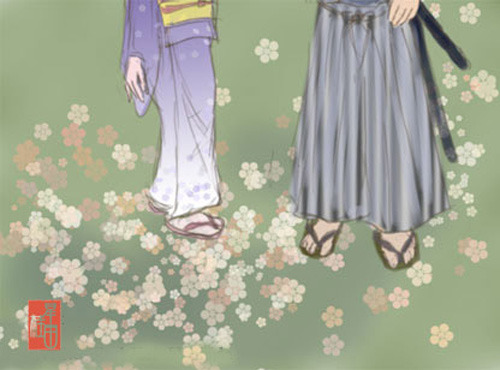
image source: WhiteWind歴史館
fushigi-dono:
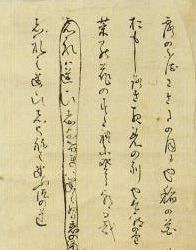
He who has fallen in love invariably falls into "mayoi" (lost in confusion or disillusion), and our lover-hero was clearly familiar with this feeling. And he who does not fall in love does not suffer from doubts and delusions, although it is not clear what he is doing in this case "on the road of love”. Maybe he just goes to fun neighborhoods
This is the only haiku in the entire collection that has the word "love" in it. And it's the only haiku circled.
Hijikata Megumi explains: "Many people think that because Toshizo circled this poem, it means he was especially fond of it. But in fact, in the world of haiku poets, circling means that the poem was rejected. So he sort of crossed it out, saying, "Don't mind me, I wrote a rubbish poem.
Hoshida Kei remembers how in "Moeyo Ken", Okita giggled at all the haiku except this one. And he adds: "If Toshizo had chosen love and family life, perhaps the history of the Bakumatsu would have been very different."
Next to this rejected poem is almost the same poem, in which "love" is replaced by "law"
WhiteWind歴史館:
If you know, you are lost
If you don't, you won't be lost
the path of love
It is funny just to imagine what kind of face "that Hijikata Toshizo" must have had when he wrote these haiku.
In Shiba Ryotaro's novel "Moeyo Ken", there is a scene in which Okita Souji comes across Toshizo composing a haiku as "Hogyoku", and he is scornful and appalled.
This may be one of those scenes where even if you are not Okita, you would have a hard time commenting, "Oh dear..." (laughs).
Perhaps Toshizo himself thought, "I really shouldn't have done this," and composed another non-love haiku next to this one, using similar words.
This phrase, which he wrote on a piece of paper, was not scribbled out; rather, it was deliberately circled.
Apparently, this is called "mise-gechi," which means to erase the part to be deleted so that it is visible, but to us, it looks as if he is insisting, "This part is important!”
Both before and after the formation of the Shinsengumi, Toshizo was a "man of love”. There must have been a time when he was unsure about his decision on the most important event in his life. If Toshizo had chosen love, the history of the Bakumatsu might have looked very different.
#poem#quote#hijikata quote#Hijikata#translated#translated from Japanese#fushigidono#series: hijikata haiku#hijikata poem
44 notes
·
View notes
Text
Oof, when you find the original source of a piece of art you liked but the original post features a quote from a poem that has antisemitic tones but you can't tell if the artist knew that or not because a lot of people are uninformed about most types of antisemitism but when you know the stereotypes the quote is referring to it's pretty blatant 😬.
Like, I really want to hope that the artist just didn't know. But I really don't want to support the artist if they actually did it on purpose.
I haven't found anything else offensive on their current blogs yet, but the original post was from a blog that's been deleted.
This is a screen shot the quote the artist used, it's from a poem called "Goblin Market" by Christina Rossetti.
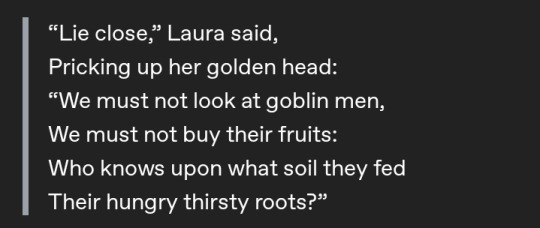
The poem is about two sisters, one of whom falls to the temptation of the golden goblin fruit sold by the goblin men and becomes addicted, then grows sick. The other sister tries to get her more fruit, but when the goblins realize she's paying with silver instead of gold and that she herself doesn't intend to eat any of it, they try to force feed her in a scene the reads a lot like a sexual assault. In the end the sick sister gets better and the two vow to tell their children the evils of the goblin fruit.
Now, maybe it's easy not to catch it if you don't know about the link between goblins and antisemitic stereotypes, or the stereotypes of jews being "greedy", or "gold obsessed", and you've never head the antisemitic beliefs that jews are "trying to replace white people", and that "white women need to be protected from other races who will seduce and violate them",
but when you DO know... Yikes. BIG fuckin yikes.
Some people try to argue that "maybe the goblins in the poem weren't originally meant to have anything to do with Jewish people," but even if that were true, when it fits the modern antisemitic/ white supremacist beliefs that much I don't think authorial intent matters anymore, because antisemitic people will use stories like these to try and spread their beliefs under a guise of plausible deniability. They also have a long history of stealing symbols and twisting stories to suit their propaganda.
Many of the adults that were around me when I was growing up were antisemitic white supremacists, so I do actually know what I'm talking about here because I had to sit through countless lectures from adults about all the things I've mentioned above, from the perspective of the antisemitic white supremacists themselves.
It's incredibly frustrating that a lot of people are unaware of the language and symbols used by white supremacists and antisemites, because it helps them hide. That's the point of dogwhistles. For example, there is a huge percentage of white supremacists who use Nordic and Celtic symbols like runes and Thor's hammers and celtic crosses to symbolize their "white heritage", and when they refer to "heritage", they mean "race purity".
Here is a good database of white supremacist symbols, phases, and dog whistles, you might be surprised by how familiar a lot of these are:
And here is a pdf that goes more in depth explaining white supremacist symbols, phrases, and beliefs:
Now, it's important to remember that not everyone who uses these symbols is a white supremacist, and that's the point, that's what makes them dogwhistles. The symbols themselves aren't always inherently racist, that way non white supremacists aren't likely to see it and clock the white supremacist. It's like a secret code to them.
Most white supremacists and racists won't actually admit to their racism, even when they are openly saying and doing racist things.
My step-father was covered in swastikas and other blatant nazi imagery tattoos, he constantly ranted about phrenology, had books and papers that were blatantly white supremacist, and had a nazi flag in the basement that he actually saluted, but he'd always say he wasn't racist. He'd say he just "cared about his heritage, and wanted to make sure the white race didn't die out," and that he "didn't hate other races, he just thought it wasn't fair that they were stealing jobs and homes from whites." < yes, those are actual quotes of things he said to prove he wasn't racist.
My point is, white supremacists and antisemites will do everything in their power to hide in plain sight, and because most people don't know their codes and dog whistles, they end up accidentally repeating or wearing them.
10 notes
·
View notes
Text
Being Succesfull
Hello everyone, Good day, I am Cizar, and I'm in 12 Grade, I'm just a simple students, An average student that just wants to pass all schools, I love arts and Doing arts is my hobby, Today I'm gonna post here in "Tumblr" my short story that I written and that's story is entitled, "being successful". My blog is all about my writing a story, poem, etc.. I hope you guys love my content. Thank you so much have a good day everyone!!!!
Ryan's story is that he is a hard-working, helpful, many people are happy with him because of his kindness and his helping in situations, he grew up with his grandmother Neda, and the two of them live together in the house. In the mountain province that is free, peaceful and far, from the city and he is also an only child without siblings and his parents are separated from him because they work. It's in a far place and he also studies as grade 10 but their school is far away and he has to cross a river just to get to school.
Even though it was difficult to go to school, he still persevered and wanted to finish because he had dreams in life and he also wanted to study in a nearby school and after a few years, his aunt from cavite visited to take him and finish his studies there as well as being close.
Aunt; "Ryan, do you want to study in Cavite?
Ryan: "Alright aunty, I want it in a nearby school"
But he thinks about his grandmother because the Isa will leave her.
Ryan: "Grandma, do you want me to go with Auntie to Cavite so I can study there?
Grandma: "It's not okay anymore, I can do it and I'm still strong.
Ryan's Grandmother is strict because they haven't seen each other for a long time and they have traveled. Ryan's aunt is quiet and sad because she left her Grandmother as if she was the one who stood by her parents since she was a child and noticed He and his aunt were sad and his aunt said that everything will be okay. Especially when he first left Manila and they arrived in Cavite, he let Ryan rest because he was tired at home and Ryan said that cgeh, aunty, I'll just rest. In the morning, his aunt told him that he was going to be enrolled at school, so he immediately transferred to a nearby school. This is where he experienced being separated from his grandmother and it became difficult in life at first, because this was the first time he was away from his grandmother and he was not used to not being by her side.
After a few days, Ryan entered the first entrance and there he learned a lot and saw that he was no longer in his place and he changed with people and places, Especially when he mingled with other people, Especially since he is a big province and most of his classmates looked at him and some of them laughed at him because he had other words that his classmates didn't understand that day Ryan was sad because he received bullying from his classmates. But he didn't pay attention to that Even though he is looked down upon by his classmates, what is important to Ryan is that he can study well and finish his studies, even though it was difficult at first, he gradually adapted to life in Manila, especially in his school. After Ryan graduated from college, he immediately looked for a job to lift his grandmother out of poverty. In the morning, he immediately ate and took a shower to apply for a job at the company while Ryan applied for a job. Nope it's easy to find a job right away and he went to many companies but none of them accepted him and that's when he gradually lost the will to apply because he didn't hire him but suddenly he thought of his grandmother that I didn't trust him On my own, I couldn't get anywhere, but when Ryan applied, he was happy because finally someone accepted him. He was so happy that he couldn't stop crying because he already had a job. Finally, he would be able to achieve He wanted a dream in life and he immediately announced it to his aunt and grandmother that he had a job. The great joy of his grandmother Neda because he finished school and now he has an honorable job. And when he first entered Ryan's work is good. The way his co-workers treat him and that's what makes Ryan happy as he improves. His work makes him happy. His manager likes him. It was shown and that's how his co-worker for a long time. He was working in what he didn't expect. His manager suddenly called him to talk to him and there they talked. His manager said that he will be promoted to CEO of their company because of Ryan's good record in the company but Ryan couldn't believe what he heard that he was going to be the CEO that he was working for and he accepted it without doubt and that's where Ryan's Life gradually got better. he got a house and a car and he improved a lot by becoming CEO. He decided to send his grandmother to Manila to start living there and his grandmother agreed and they started to live peacefully and quietly with the his aunt was happy because she fulfilled her dream in life. The end"
2 notes
·
View notes
Text
WIP Wednesday: Upcoming Group Think
As I mentioned in the tags of an earlier reblog, I’m working on the Thomas as Heir fic again. This is for two reasons: first being that I really do want to finish at least part one of this thing before I die of old age. Second being that the most recent similar fic has almost the exact same title as my working title, is part of a series with almost the exact same name as I was going to use, and has some details that are creeping much closer to what I have than anything I’ve seen before.
No, I’m not calling Fandom Copyright Infringement. I’ve not posted that info before, so there’s no way the other author could have copied me. Similarly, I was unaware of that project until it went up. This isn’t even a matter of great minds thinking alike, it’s more like two grade school kids being handed pictures of the sun to colour and reaching for the yellow crayon. Seriously, naming a story about a stolen kid after a Yeats poem is kind of a no brainer.
I do want to get this done before someone else accidentally writes the exact same story, though. I mean, there are only so many ways to do this thing. It’s bound to happen eventually.
(And no, I am not changing my titles. I’ve as much right to the yellow crayon as anyone else.)
Anyway, since I’m hitting the part of the narrative that was shot all to heck with my last brainstorming session and am basically back to the ‘throwing pasta at the wall and seeing what sticks’ stage, I will probably put a thing up in the next couple of days asking for thoughts and feedback, because that was kinda insanely helpful last time.
In the meantime - I WROTE EDITH’S POV AND I’M REALLY PROUD OF MYSELF FOR THAT!
-
“I don’t understand.” Edith frowned into the mouthpiece of the telephone. “Is something wrong with the baby?”
“No, there’s nothing wrong there,” her mother’s voice assured her, “or with Mary. They’re both in perfect health.”
There was a small noise behind her and she turned to find Bertie crossing the room, an anxious look on his face. He must have heard her last question. “Well it’s a relief.” She gave her husband a reassuring smile and he visibly relaxed. “But what else is so important that you can’t just tell me over the telephone?”
“We’ve a mystery on our hands,” the older woman replied, her tone both serious and coaxing. “And it involves the whole family. It’s quite complicated, so we’d like to only go over the details once. Your Grandmother is seeing if Rosamund can come, and I’ve already asked the Mertons. They’re free all week.”
“Well we can’t come down tonight.” Edith frowned, mentally reviewing her calendar. “We’re having the archbishop over to dinner, but we might be available tomorrow. One moment, let me ask Bertie.” Lowering the mouthpiece she said, “It’s Mama. She wants to know if we can come down for a day or two this week.”
“As far as I know.” It was Bertie’s turn to frown. “I’m tied up in meetings with several of the farmers in the morning, but I don’t see why we couldn’t be down there by about tea time. We’ve no other commitments that I know of until Monday, at least nothing we can’t reschedule.”
With a nod, Edith turned her attention back to the telephone. “We could be there for dinner tomorrow night and make a Friday to Monday out of it.”
“Wonderful, thank you, Dear.” The relief in her mother’s voice was palpable.
“What if Aunt Rosamund can’t make it?”
“We’ll tell you anyway,” was the promise. “And you’ll get to see us all, so it won’t be a wasted trip.”
“It’s never a wasted trip when we’re visiting you,” Edith laughed, despite the strange, mysterious circumstances. “If nothing else, it will be good to see Mary, before the baby’s born.”
“Who knows? Maybe the baby will be born while you’re here.”
“That would certainly be convenient.”
“I’ll see you tomorrow, Dear. Goodbye.”
“Goodbye.” The line went dead and Edith hung up. She felt utterly befuddled.
“What’s going on, Darling?” Bertie asked, his own expression as curious as she felt.
“I don’t know for certain,” she confessed. “Apparently there’s some sort of mystery going on and it’s all a big fuss. Mama didn’t want to tell me over the telephone.” She shook her head. “She was being very mysterious, which isn’t like Mama at all.”
“But the baby’s fine,” he confirmed, “and Mary?”
Edith sighed, unable to deny she was relieved that all was well in that quarter. Much as she and Mary had never gotten on, she wasn’t ready to bury a second sister. “She says so, yes, and she wouldn’t lie about that. Whatever it is, it’s something different.”
They looked at each other for a moment, then Bertie shrugged. “I suppose we’ll find out tomorrow, then, won’t we?”
“I suppose we will.”
#downton abbey#downton abbey fanfiction#alternate universe#wip wednesday#lady edith#lady grantham#bertie pelham#phone conversations#long lost heir fic
6 notes
·
View notes
Text
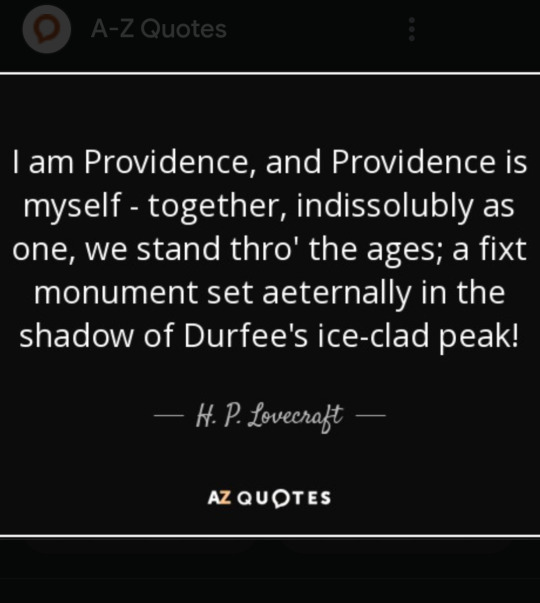
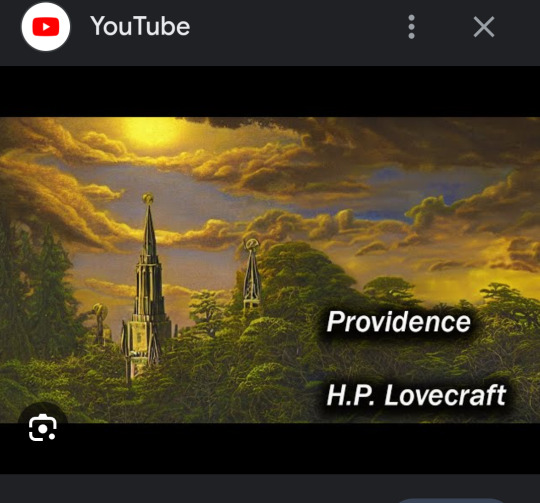
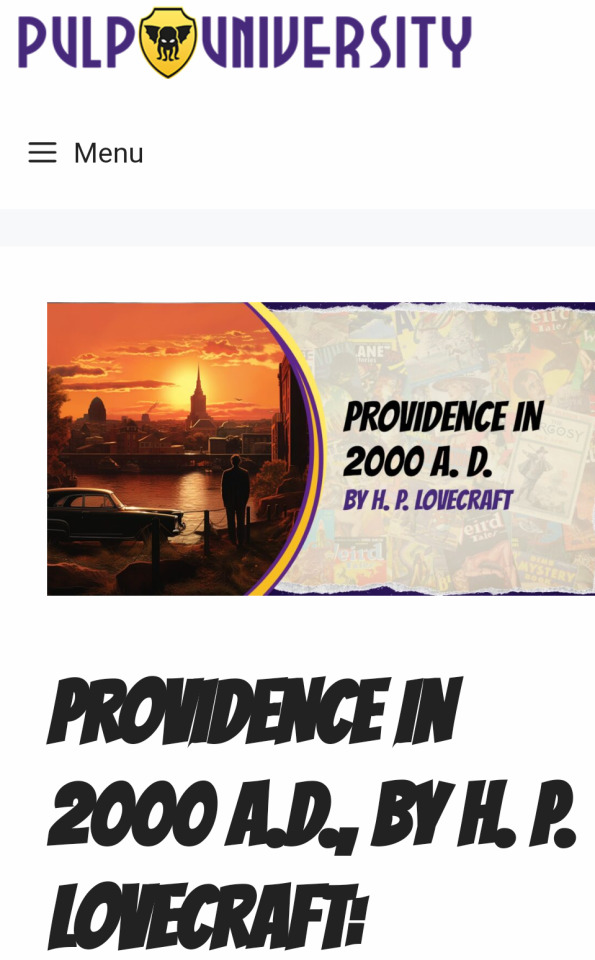
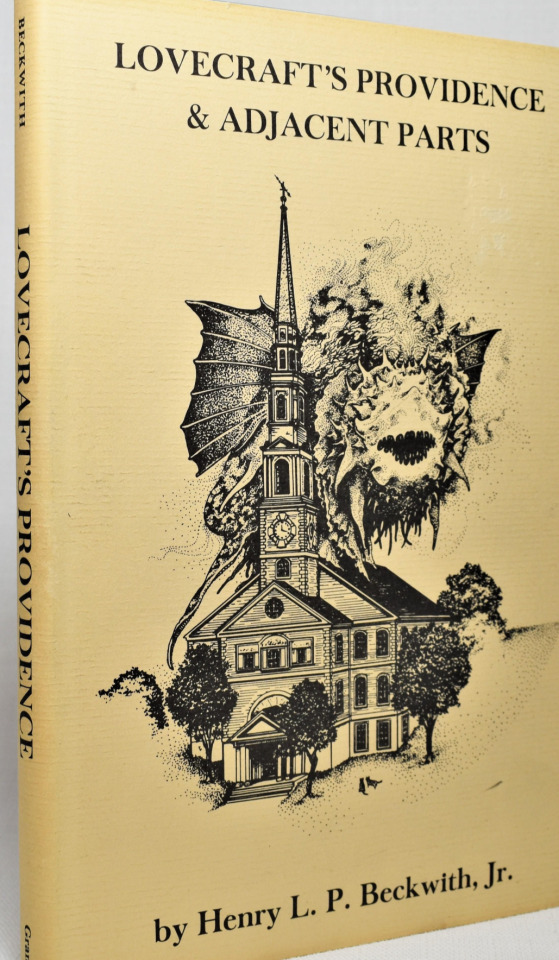
Pics:
1. Lovecraft's identification with the city of Providence was the result of his nightly explorations & his relief at going home - after his 'horrifying' life in NYC.
2. This is Howard's view of 'heaven' on Earth! He grew up here & knew this city intimately.
Even after all of the pains that HPL suffered here, Providence was his choice of sanctuary.
3. The early racist poem that we'll be examining today...
4. THE 1st guide to the Lovecraftian side of Howard's favorite city - on Earth.
1912: HPL Output.
Intro: Since HPL's 1st racist letter was published in a local newspaper, I'd guess that Lovecraft decided to try his hand at writing more of the same.
This year saw a real explosion of written pieces from Howard. Some of it racist, most of it 'experimental.'
Output: "Providence in 2000 AD" was published in the local Providence Evening Journal.
It's supposed to be a satire directed towards Italian-Americans & 'other' races that HPL feared.
This work imagines the displacement of white folk by immigrants.
It's amazing the suspension of common sense that 1 has to go thru, to not see the blind stupidity of such statements.
I mean, everyone born in America are the children of immigrants - including white people.
What matters most is how we treat each other...
But, the integration of races was a major horror for Lovecraft.
Anything, he wrote, would be better than "the mongrelization & eventual deterioration of (the White) nation."
And, nothing - but "pain & disaster - will come from mingling... Blacks (with) Whites."
Plot: The usual, nameless narrator visits Providence, R.I. - where immigrants displaced his ancestors.
The city has changed so much, it's impossible to understand the new language!
And, "the city (echoes) with foreign cries."
Streets & landmarks have also had their names 'overthrown.'
Mechanical devices are "shaky" & rails have become "rusty."
The Post Office & schools are "ruins waiting to be sold."
People are "loud" & "factories (have) increased the din."
The racism comes in "where(ever) clustered swarthy men of every hue & shape."
Jews are targeted by the age-old racial taunt "the wealth that Israel (illegally) amassed."
And, French "Gauls from Canada poured in..."
"In terror" (though never threatened in any way!) our brave hero retreats back to the wharf.
Like in "Shadow Over Innsmouth", the narrator meets a white survivor, "a half crouched, shriveled form" identifying himself as "the last American!"
Future Tech: In this narrative poem, giant ships cross the Atlantic Ocean - in a day!!
Inspiration: All of this anxiety was due to the Providence Evening Journal's announcement of Italians wanting to change Atwell Avenue to Columbus Avenue...
Criticism: This work shows much fear about cultural changes - which never truly manifested in reality.
For those who care for such things, Providence is still white as bread today - in January, 2024!
The city's not crumbling into ruins.
Nor have Jews taken over its trade. They have more important problems in their own country...
So... Big oops!! You were (or still are) worried over nothing.
Though we are going thru a period of foreign influence & out of control immigration - it's due to Putin's spies & our own gas guzzlers...
Climate change & drug cartels are now forcing people to uproot their lives.
These folk now find themselves trying to seek safety (& work) in the most successful nation on Earth.
But, the move to robotic systems here, is starting to choke off many avenues to employment - menial or otherwise...
These are events which are only growing our homeless population.
But, if we're only looking for someone to blame - look in the mirror.
It's all of our choices that have led to today's many problems. As it has in the past as well.
We can, in the future, try to choose a bit more wisely...
But, don't expect any to make any major changes. We've shaped the world to fit our own wishes - no matter who disapproves.
And, people don't really change - only our tech does...
1 note
·
View note
Text
My Final Manifesto!
Over the course of taking this class, I've done many post pertaining to art pieces, poems, music, and life. I've done posts on Women Empowerment, Abstract Art, Public Art, Love, Grief, Poetry, and Paintings. My women empowerment post represented natural beauty for black women , as the photo shows the natural hair embedded with powerful phrases and the beautiful skin. The details in the photo that are important are the words embedded in the woman's hair. The embedded words are to show that the women portrays those phrases and symbolizes meaning to them.The details that appeal to me is the natural beauty of a black from the fro to the fair skin tone and how the words embedded in her hair represents how she embodies herself to everyone around her, especially young black women/girls like myself. Abstract Art a painting created by Fernard Legar in the years 1918-1923 during his mechanical period. First look at this painting and you think its just a bunch of shapes put together and some color. It is much more than shapes and color, this painting reflects on Legar's mechanical period where he was obsessed with machines and modern technology.n Legar's painting he was trying to and I quote "bring to mind the urban architecture, new modes of transportation, and time-saving technologies that were transforming the modern world". Legar's aesthetic and fascination with modern technology and machinery has gained attention of alot of people and have called his work Tubism, as reference to the painter Pablo Picasso who was known for Cubism. Public Art a sculpture called the Cross Currents, sculptured by Albert Paley in 2001. It is currently located at Florida Gulf Coast University in the campus courtyard. Albert Paley is a world renowned metal sculptor artist and "In creating a work of art, besides my personal experience, my concern is how it emotionally and intellectually engages the viewer. A love poetry by Elizabeth Barrett Browning written in the 1850's. The love poems were written in dedication of her husband who was also a poet, Robert Browning. The meaning behind the "Love" poem is an expression of a female lover, one who is trying to demonstrate the intensity of feelings and emotions between two loved ones. I expressed my grief where I chose my theme to be Heart Broken because I recently suffered a heartbreak that I am still trying to cope with. Just recently (a little over 2 months ago) I lost my Grandfather on February 19, 2023 and it has been very hard as I am still grieving and learning to cope with his death. Ever since then I've gone down hill, with school and procrastination, hiding my feelings. Ive been throwing my self in work so I don't have to deal with it. But music has been a coping mechanism for me as it helps me calm down, and brings me hope and happiness. Although the music I chose are more based on relationship heartbreaks, I can feel there pain in there music, and I can relate to the pain. The painting to which i had to create a poem to go along with it. This painting is one of the most beautiful I've seen. The vibrant colors combine with a peaceful flow making it a strong centerpiece.Painting ''Expression'' is done by the Ukrainian artist Anastasia Kozorez. Painting with professional oil paints on canvas. The face woman is made in yellow, blue, violet and orange tones. A light color is associated with a light source or the light itself reflected in the composition. The bright colors describes the purity or strength of a colour. Bright colors are undiluted and are often associated with positive energy and intense emotions. My posts have portrayed, empowerment, love, excitement, vibrance and lose. With this course I've explored and learned many things and it has opened my perspectives on life. Although it has been a tough semester, I managed to try to get myself together with everything happening.
0 notes
Text

"A Tour to Writing"
-Galang, Carl Jaspher
When I was young, I always hated writing so much to the point that my parents were waiting outside of the classroom for me while all my classmates were done. Until now I still do not know the reason why I hated writing that much, but, at times, it also crosses my mind that maybe I hated writing because, at that time, I did not yet know the power that writing holds. It continued up until I was in Junior High School. When I was in 7th grade, whenever there were activities such as poem writing, I was always the one who did not pass anything even though I know that it has a significant contribution to my grades. The same thing happened when I was in 8th grade, I even remember my mom getting mad at me because my grades were so low because I hated writing. As I grew up, I came to realize that writing is one of the most powerful skills that one can have; it might change the world, one’s views, learning, and expressing one’s feelings. Many people have told me that I am good, it is just that I always doubt my abilities. I did not believe them at first, not until…
When I was in grade 9, I had a Filipino teacher who had a big impact on why I write today. He not only helped me find my true self but also helped me show the skills I have hidden for such a long time. One time, we were tasked to make a poem. I was so scared because I knew that I would not pass the subject because of how hard it has been for me, I always did not have the confidence. He showed us an example which is written in Filipino. The poem sounded really nice to me so when the task was given, I tried to do it to the best that I could. When the scores came, I was surprised because I got a “SobreSaliente” for the first time. Since then, I applied the technique that I used when I wrote the poem to every essay and reflection that was tasked to us. Again, for the second time, I was surprised because it came out to be perfect. Since then, I loved making essays which is why I took HUMSS. I did not know before that for a person to be able to write a good piece, he has to write it with all his heart; express his feelings. My Filipino teacher had a novel read to us in 9th grade which is about the Philippine national hero Jose Rizal’s novel entitled Noli Me Tángere. It changed so much about how I view my people, my country, and how I perceive things. Noli Me Tángere showed me the importance of seeing others’ perspectives through writing which made me see things that I could not comprehend before. It helped me recognize how writing can help someone understand certain things that can’t be just obtained in one sitting. When I was done reading Noli Me Tángere, I thought of trying to read other stories on Wattpad because of how I enjoyed reading Noli Me Tángere. To my surprise, I found a book that is somehow similar to Noli Me Tángere, which is “I love you since 1892.” I loved the story so much that I tried making my own stories which I posted on Wattpad. But then, I realized that there were too many to fix so I deleted the book. Those compliments that I got from my first book, even if some are small compliments, I think that those small compliments really had a big impact on me because they make me feel as though my efforts are acknowledged and gave me a sense of drive to write better. I tried to make a new book again, and since then I have loved writing so much.
Seeing now how much I love writing; I realized that the reason why I hated writing so much before was that I never even bothered to try. I realized that one should always try because no one’s best is not enough. After all the experiences that I got over all the years I learned that it is through writing I can express myself, I can create things without consequence, and I can carry on even though it is hard to do. We learn things that we still can't comprehend, even our own talents can be hidden without us knowing in the first place. Writing is a safe place because it helps us express ourselves with words so that we can comprehend our own existence and emotions for ourselves. We learn so that we can see ourselves in a different light, and if that is how writing can affect a person, it might as well be one of the most important things we will learn in our lives, so right if you feel like writing, nobody will judge you, because everyone starts from somewhere. And at the end of the day we create and destroy things, all the same, so creating something out of this world, something maddening, something beautiful, can help us realize that not all things should be perfect to be great writing.
1 note
·
View note